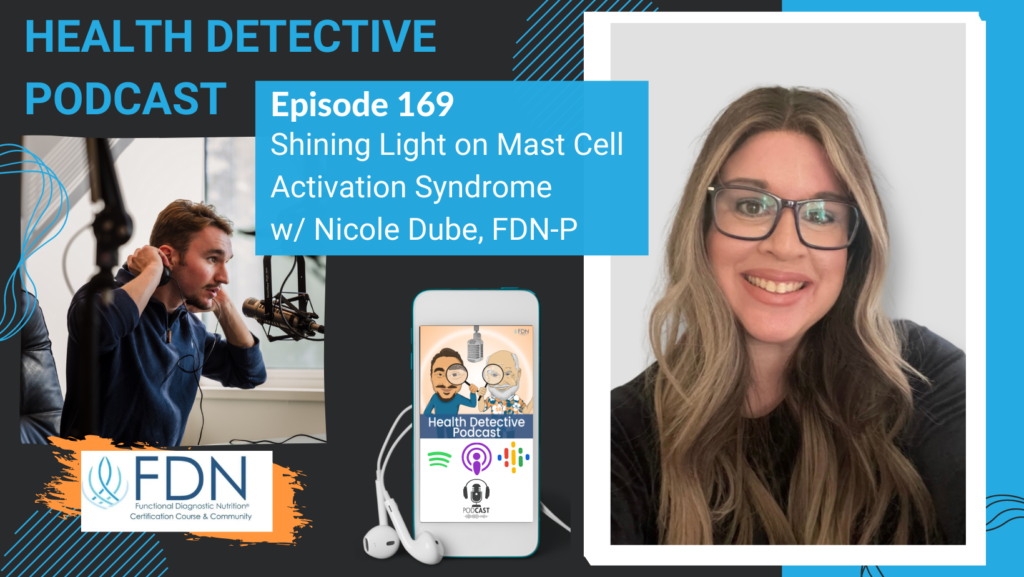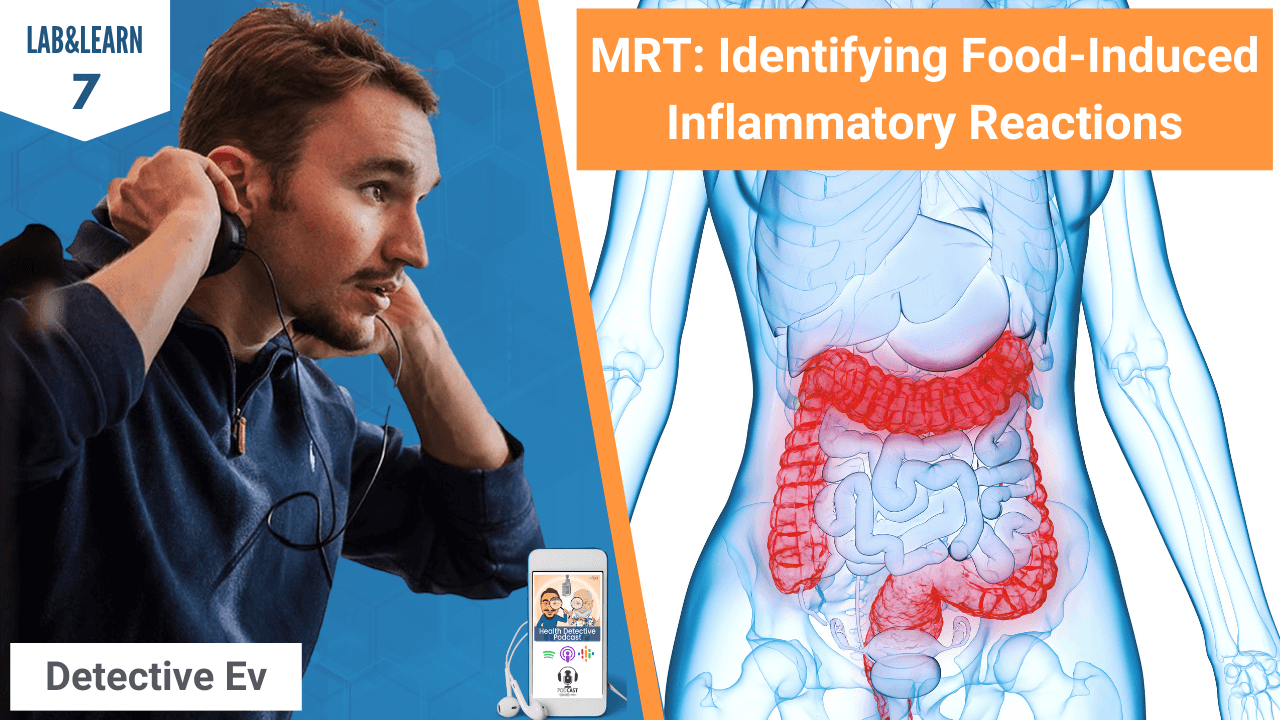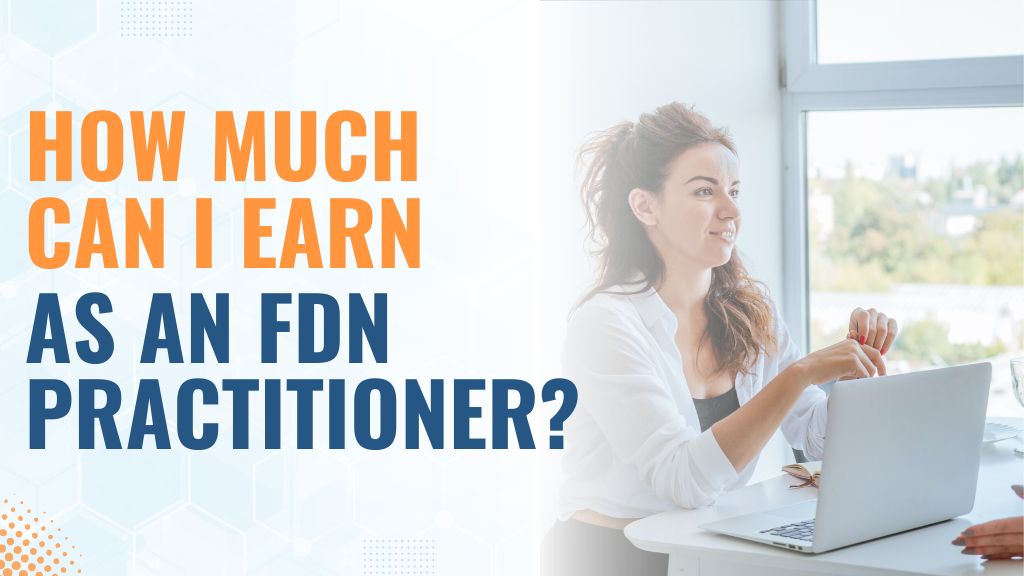Introduction
[00:00:00] Detective Ev: Well, hello, my friends. Welcome back to another episode of the Health Detective Podcast by Functional Diagnostic Nutrition. My name is Evan Transue, AKA Detective Ev. I will be your host for today’s show concerning mast cell conditions.
We have a pretty special guest on today. Not only because she is an FDN, but I found out right before we recorded that she had just gotten hired as an FDN mentor. Now we’ve had a few mentors on actually, I don’t think particularly recently. It’s kind of been in the past and I feel like you guys, if you’re regular listeners, you already know this. FDNs are held to a fairly high standard. So, if you are trying to get hired to be one of the mentors, that’s not really just handed out to everyone so really cannot commend this person enough.

Her name is Nicole Dube. She is a state-certified, double board-certified clinical and holistic nutritionist and FDN practitioner. She has been in private practice for over nine years and uses her personal experience with Mast Cell Activation Syndrome and POTS to help her clients go beyond managing symptoms and look for the underlying pieces to their healing puzzle. Her mission is to teach people, to approach healing holistically, addressing the body, mind, and spirit in order to give the body the tools it needs to begin healing.
Now what’s really fascinating about this is she is the first person to come on, I think ever, that had Mast Cell Activation Syndrome. Certainly, if anyone even talked about it, the episode was not about that. I had a lot of ignorance about this.
Newest FDN Mentor
If you’re new to the topic, do not worry because I’m coming from the perspective of someone, I don’t know nearly enough about it. I have a ton of colleagues that know about it. If, God forbid, it ever happened to someone I love, I would send it their way. I don’t know enough about it.
It does not sound like a particularly fun thing to deal with. So, I’m very glad that we have people in our community to help us create podcasts like this, to give some insight on something that is very not fun, even in the world of chronic illness, which is an inherently not fun space.
Without further ado, here’s today’s episode.
All right. Hey, Nicole, thanks so much for being here with us today.
[00:01:58] Nicole Dube: Thanks for having me. I’m really excited to be here.
[00:02:01] Detective Ev: I’m excited to talk with you.
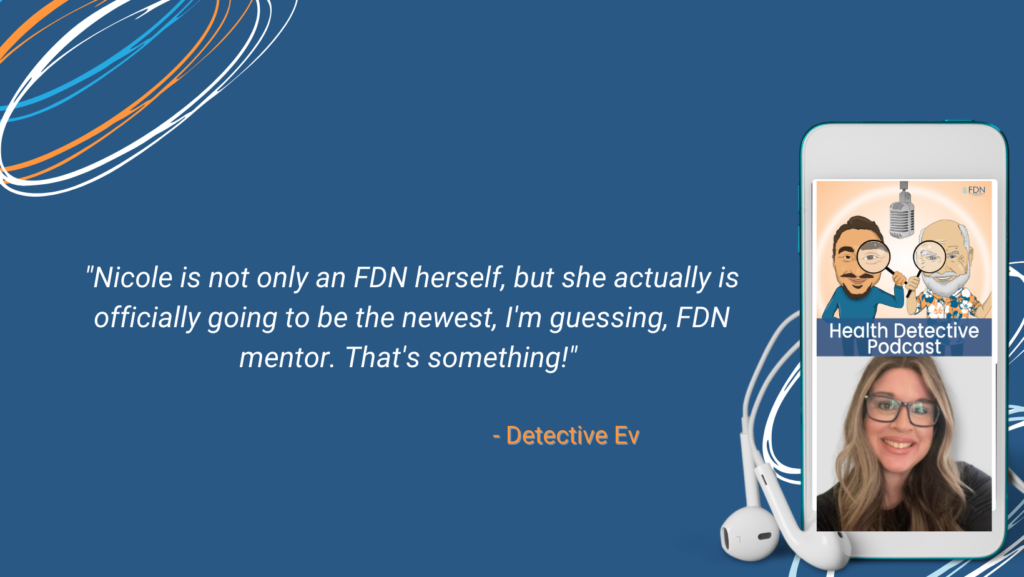
For those that are listening, we have kind of a cool announcement that I just learned all of 45 seconds ago. Nicole is not only an FDN herself, but she actually is officially going to be the newest, I’m guessing, FDN mentor. That’s something!
And I told her this, it’s not just flattery on the podcast, it is legitimate. I mean, I’ve been here five years. We talk about all the time on this podcast, how, if you want to pursue the FDN course, that’s great. Understand, you’re going to be studying, there’s work in this. It’s not just, I show up for an hour or two once a week and I get my certificate at the end. It’s something that is earned. Which is a good trade off, cause it’s respected. That’s the other side of that.
The Onset of a Mast Cell Condition
But they’re already selective enough about who’s getting through, then to be the someone that’s like actually helping these people, that’s a privilege. So, congratulations.
Again, welcome to the podcast. I know we’re also going to talk about some health stuff today and that’s ideally what I like to do on this show. Now we always start off the exact same way as I kind of prefaced with you beforehand. I like to know what the person dealt with because no one gets into this work by accident.
What I’m curious about is when did Nicole’s health symptoms start and what did they look like? How far are we going back here?

[00:03:09] Nicole Dube: We are going back to my twenties. There, I kind of developed a landscape of autoimmunity, celiac disease, Hashi’s, gut dysbiosis, I had all of that kind of stuff. But when it really became significant for me, and super challenging, was in my late thirties when I had the onset of a Mast Cell condition.
For me, it started with a vaccine, actually. I had gotten a vaccination and within 24 hours, I had the first anaphylactic reaction I’d ever had in my life. I just didn’t understand. It was totally random and weird to me. But then, over the next couple of months, I started to have this body breakdown in so many different ways and it was really bizarre. It started for me with cardiac symptoms.
Mast Cell Condition – Becoming Sensitive to Everything
When I would go work out in the morning before work, like I had always done, I would go for a jog or something. I started to get really bad chest pains and shortness of breath and all these weird things were happening. I ended up seeing a cardiologist and I was failing the stress tests.
Was admitted to the hospital and they did an angiogram, they couldn’t find anything. There were no blockages, structurally, it was fine. But there was ischemia, they couldn’t tell me why. So, they just put me on beta blockers, which I now know are terrible for people with mast cell conditions.
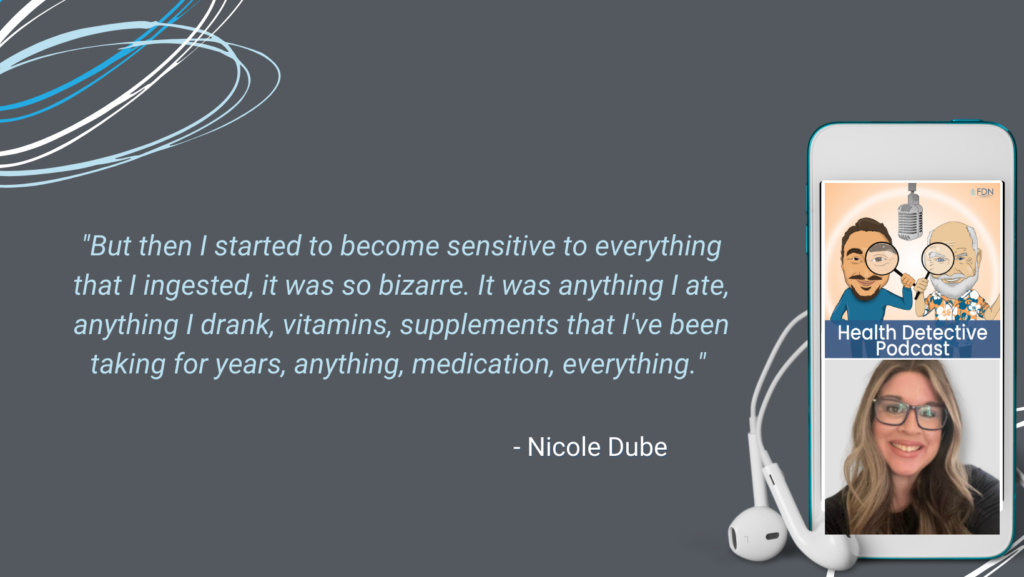
But then I started to become sensitive to everything that I ingested, it was so bizarre. It was anything I ate, anything I drank, vitamins, supplements that I’ve been taking for years, anything, medication, everything. I was just reacting to everything. I started to have blood pressure issues.
I couldn’t get through the day. I would be at work, and I’d just go out to my car, cause I felt so horrible. I just couldn’t get through the day, and I couldn’t figure out why. During this time, I had probably gone to the ER like 24 times, no exaggeration, within a couple months. I was having constant allergic reactions.
On one of those visits, they wanted to do a CAT scan of my head and neck, so they gave me iodine contrast dye. I had an anaphylactic reaction to it, which I’d never had in the past. But for them to see it in real time in real person, the duck lips, the hives, and all that, they admitted me into the hospital right away. They were like, all right, we got to figure this out.
Diagnosed Positively with POTS, Unfoundedly with Anxiety
At the same time, I had the onset of POTS, which is postural orthostatic tachycardia syndrome. In a really simplistic way, my blood pressure would drop super low, my heart rate would jack up as if I was sprinting, it’d go up to like 160. Then the blood would pool in my legs and a lot of times I would faint. So that was happening too.
I was in the hospital for, I think, five weeks total and got the million-dollar workup. They had different theories along the way. They thought I had lupus. They thought I had MS. They thought I had a pheochromocytoma, which is a mass on your adrenal gland, that secretes hormones. There were different theories along the way, but they could never quite figure it out.
When I was in the hospital, I was down to four foods that I could eat without having an anaphylactic reaction. I was in anaphylactic reactions all day, every day. I was on mega Benadryl 24/7, steroids 24/7. I was on a bed alarm because of the POTS. I couldn’t sit up, stand, or walk without fainting.

So, I wasn’t allowed to use the restroom, the shower, you know, all of that. I was basically on my back, it was horrible. It was such a dark night of the soul type of experience. I was in there and they really couldn’t figure it out.
I remember it was Christmas, it was like the day before Christmas. They’re like, okay, we can’t figure this out. Do you want to go home? I was like, okay. So, they discharged me and diagnosed me, which really pissed me off, with anxiety. They told me, you’re just anxious. We can’t figure this out. They just shipped me off home.
Diagnosed with Mast Cell Activation Syndrome
Detective Ev: Who wouldn’t be anxious? Right?
Nicole Dube: But also, that wasn’t what it was, and I knew that, obviously.
I remember too, my dad, who came to visit me one day, he’s a psychologist and had been for like 50 years. I remember him getting into an argument with them of like this isn’t anxiety, you know? You can’t figure it out. You know, that tends to be the go-to, particularly with younger females, I’ve found, when they can’t figure it out. It’s just, all right, you’re anxious. So, they discharged me.
I hadn’t improved at all; I didn’t know what was going on. So, I went home for Christmas to my parents’ house, and I just was so incredibly sick I couldn’t even sit. They had a room with a fireplace, and I couldn’t even sit in there because the heat triggered allergic reactions. It was everything, it was so bizarre.
I think it was the day after Christmas, they found me passed out again, cause they kept finding me passed out places. I was passed out at the top of the stairs. I banged myself up pretty badly and they were like, all right, that’s it. They put me in the car, and they drove a few hours to Boston where there were a lot of really great medical facilities.
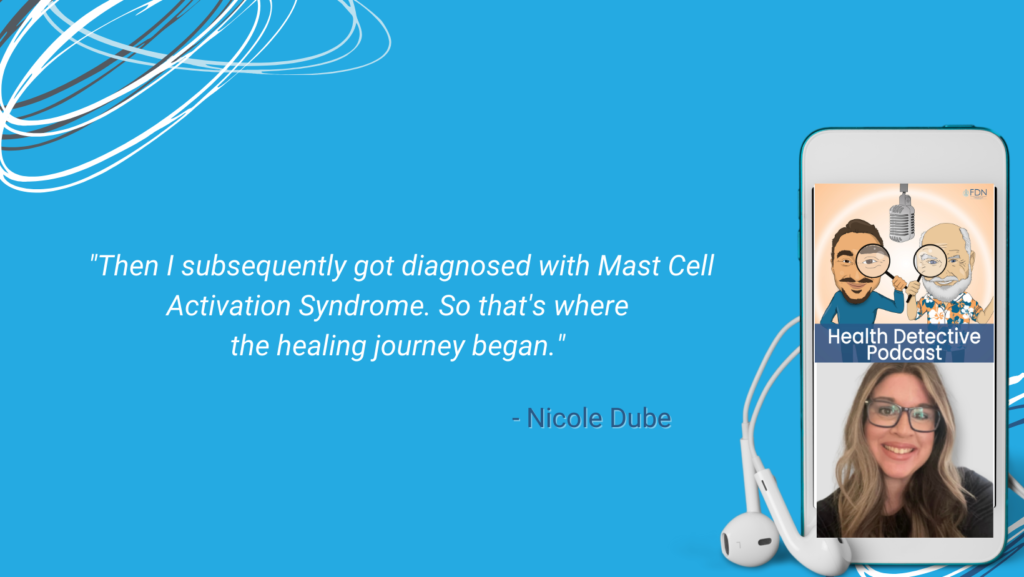
They took me to Brigham and Women’s Hospital, which happens to have, I think, one of the country’s only Mast Cell Centers, in their hospital. Long story short, after I was there, I got hooked up with their mast cell physicians. Then I subsequently got diagnosed with Mast Cell Activation Syndrome. So that’s where the healing journey began.
Unfounded Diagnoses of Anxiety or Depression
[00:08:03] Detective Ev: Heck of a story. We got plenty to work with today, that’s for sure.
I’m sorry that all this crazy stuff happened. But at the same time, considering now, it’s great to see people on the other side. Cause now you’re like knowing this and now knowing that you’re also just became an FDN mentor, that’s pretty lucky for the people that are going to get to work with you. We need people like that, that are teaching this stuff and helping people. I think that’s amazing.

And just to be clear, cause I didn’t want to cut you off. What I meant with the anxiety is, you know, obviously, they give out these totally unfounded diagnoses of like anxiety or depression when people are having legitimate things.
[00:08:36] Nicole Dube: It’s a side effect of it. Right? I know that’s what you meant and that’s what I meant too. The primary issue wasn’t anxiety. It was a function of what was going on. So yeah, totally get that.
What are Mast Cells?
[00:08:47] Detective Ev: Yeah. And the only reason I even specified is we don’t know each other.
That happened to my mom for seven years. It took her seven years to get diagnosed with Graves’ disease. They kept saying, it’s in your head. They offered Xanax, SSRIs and stuff. And yeah, I’m sure she was anxious and depressed, but that’s not the core of the issue.
So, with that all said, the one thing I want to define, actually, before we even go further is, what is Mast Cell Activation Syndrome?
I’m always very honest on this podcast. I know a lot about health, I am not the most advanced FDN in the world. I think my ability and purpose here is to interview people like you. I actually don’t know what that condition is. I have heard it listed a million times in AFDNP, but I would not be able to tell someone what that is. I would assume the audience might be in a similar boat, at least some of them. So yeah, what does this diagnosis actually mean?
[00:09:32] Nicole Dube: Sure. There’s a continuum of mast cell conditions, right? I’ll talk about the two major ones.
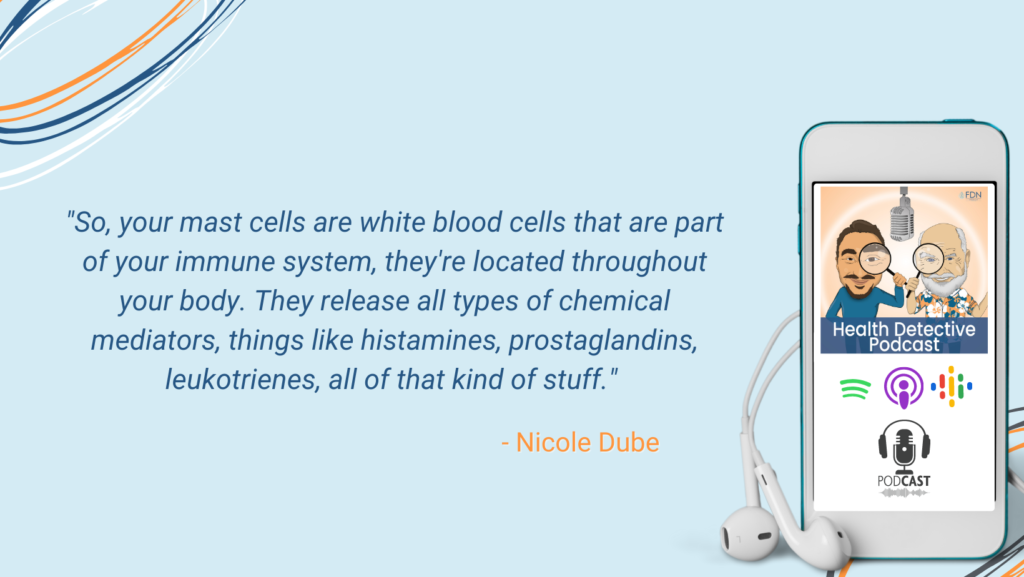
So, your mast cells are white blood cells that are part of your immune system, they’re located throughout your body. They release all types of chemical mediators, things like histamines, prostaglandins, leukotrienes, all of that kind of stuff. They do that in response to a pathogen or an allergen.
Think about if you get like a mosquito bite and that rush and that raised lump, that’s your mediators going to address the issue.
What is Mast Cell Activation Syndrome?
When you have a mast cell condition, I’m going to oversimplify it, you can have too many mast cells in your body, there’s a proliferation of them. They react in a normal way, but you just have too many of them. That can fall under the umbrella of what we call mastocytosis.

Then there’s Mast Cell Activation Syndrome, which is what I was diagnosed with. That means that you have a normal amount of mast cells in your body, however, they become hyperactive and hypersensitive. They go off when they shouldn’t, you’re in a constant allergic state. They’re sort of hyper regulated.
That’s typically when people are talking about mast cell conditions, those are the two types that they’re talking about.
A lot of times, now, people are talking about Mast Cell Activation Syndrome, because I’ve seen a lot of people talking about it lately. Particularly in post COVID too, I’ve found a lot of Long Haulers have mast cell activation type issues going on.
[00:10:51] Detective Ev: Got it. This is one of those things where, I believe this with most of the things that we list off in this show, the diagnoses that people come on with, it seems like this is in many senses, a result of the modern world. Or there’s contributing factors from the modern world that lead to these things. It’s one of those situations where the symptomology that you’re describing, I have heard people say before, but even in our world of functional medicine, it’s not like this is the most common thing.
How Does Western Medicine Treat Mast Cell Activation Syndrome?
Like, I hear like Hashimoto’s a lot, right. That’s totally typical, almost par for the course, half the time, the gluten sensitivities or whatever. But this is getting a little more specific even in the world of functional. Now, what I did not know, admittedly, is that that was a Western medicine diagnosis that was actually given.
So, what on earth do they make of this? Like, what do they do? Because I’m going to guess it is dramatically different than the approach that we might take if we’re trying to self-heal.
[00:11:41] Nicole Dube: Yeah. Getting a diagnosis can be tough for people. Typically, how they diagnose you is a bone marrow biopsy. They’ll take serum tryptase levels, or they’ll do a 24-hour urine catch and they’ll look for histamine levels, prostaglandin levels, leukotriene levels.
But the key though is if you have Mast Cell Activation Syndrome, you have to be in a flare at the time they do the test. If you’re feeling pretty stable and pretty good, and you’re not symptomatic, it’ll come back normal. A lot of times people will get diagnosed just off symptomology alone if they have those symptoms. But also, if they take antihistamines and they feel better, that tends to be the markers that those immunologists and allergist look for.
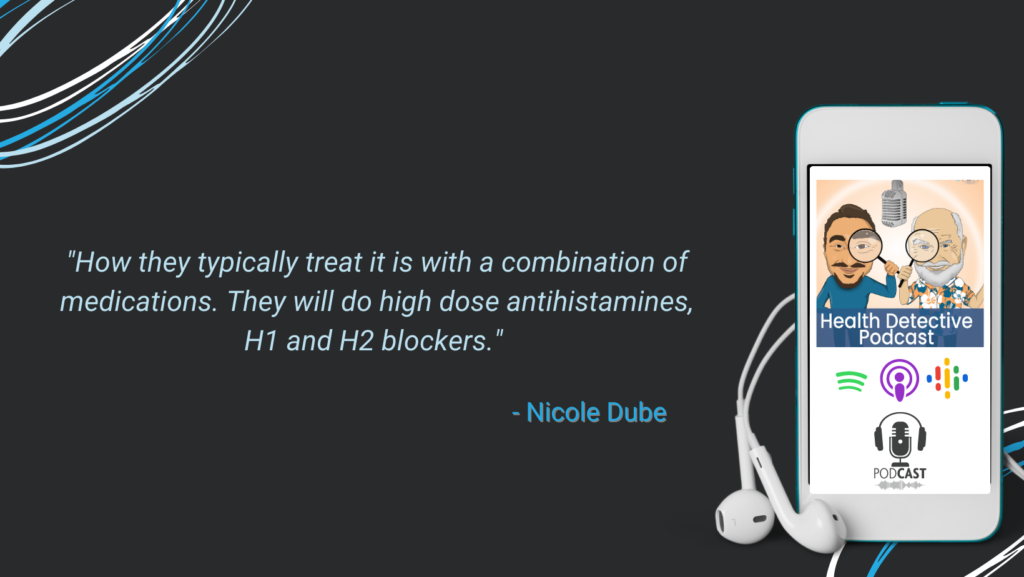
How they typically treat it is with a combination of medications. They will do high dose antihistamines, H1 and H2 blockers. The H1s are things like Claratin, Benadry, Zyrtec. The H2 blockers are things like Tagamet, Pepcid, that kind of stuff. Then they’ll typically give you some type of mast cell stabilizer medication, and that’s something like Chromolyn sodium and Ketotifen. Then sometimes they’ll give you a leukotriene inhibitor, and that’s something like Singulair.
Western Medicine Has No End-Game Plan for Mast Cell Conditions
There are other meds that they try out on you. Sometimes they do Xolair injections with some people, low dose Naltrexone with some people. It’s a combination of mast cell stabilizers and then the antihistamines, but it’s mega dosing.
I was on enough Benadryl to kill a horse, in the beginning. It’s so much, they just pump you full of those things to get you to calm down the allergic reaction and calm your mast cells down. It’s a very different approach than the FDN approach, for sure.
[00:13:23] Detective Ev: Listen, I specify this as much as I can, and it’s usually every episode because it’s important in case, God forbid, someone is listening for the first time. I can never forget that just because it’s routine for me, it might not be routine for the person listening.

Guys, we’re not against Western medicine in any way. No FDN that I know of is. Clearly what you just described, Nicole, is not something that really has an end game plan. That is fair to say. It’s more like, we have some treatments for this. Right? I’m sure that did help to some degree, but these are things that have very severe long term side effects, even if you’re just on normal amounts.
Antihistamines are not fantastic for the body, let alone mega dosing. And at the end of the day, the thing people need to understand is it’s not getting to the root of the issue. That’s what I’m curious about cause I don’t know.
I’m learning about the syndrome. I’m learning about the Western medicine approach with it. Did they just tell you; you’re going to be on this stuff for the rest of your life or what was the thought process?
Stabilizing the Mast Cell Condition Until Something Changes
[00:14:12] Nicole Dube: Yeah, it was interesting. I agree with you. I want to put this disclaimer, like you just said, I’m not at all against the meds and if you’re anaphylactic like I was, you need the meds in the beginning. And I’m somebody who’s very much into alternative and natural holistic health.
I knew I needed the meds at that time and that’s okay. So don’t ever stop taking them, especially if you’re anaphylactic, if you’re not under the care of a provider. Cause it could be really bad. But yeah, it’s more managing symptoms.
For me, at the time, they would say, I remember I had a doctor say to me, well, you should just go on disability and learn to live with this. I remember every cell in my body rejected that. I was like absolutely not. No, no. So, I knew in that moment, I would have to find my own way out of it and be my own health detective and my own advocate. That’s what I did.
But yeah, it’s more managing symptoms, right? They put you on these meds. I remember talking to my mast cell physician about this at one point and she was saying that sometimes a lot of people will have some sort of turnaround point. But she couldn’t tell you when, it could be 20 years from now. The idea is for them to wean you off of it once you get to a good place, but it could be 10 years, it could be 20 years.
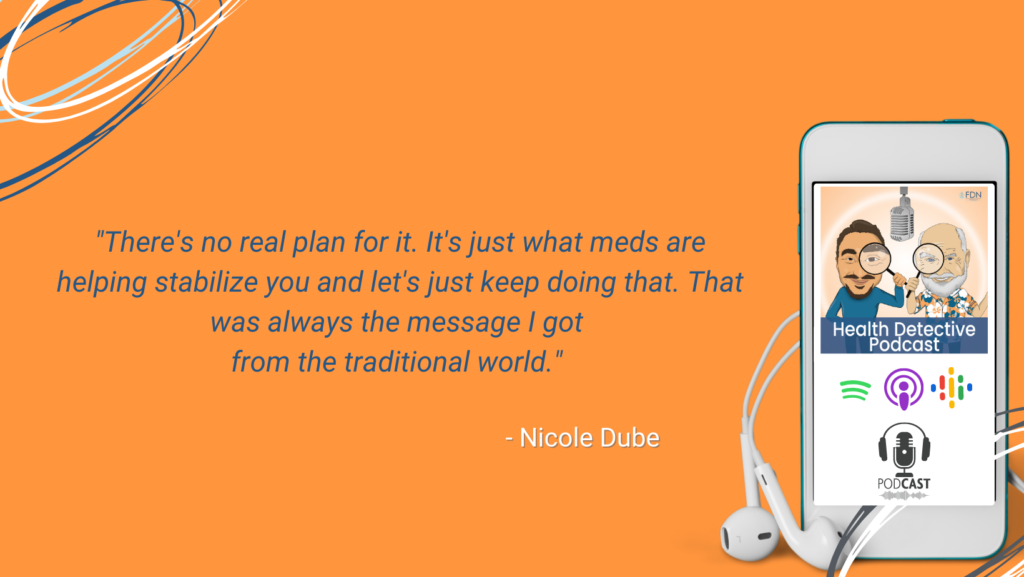
There’s no real plan for it. It’s just what meds are helping stabilize you and let’s just keep doing that. That was always the message I got from the traditional world.
Don’t Get Mad at the Doctors, Get Mad at the System
[00:15:30] Detective Ev: This is a perfect example in your case, because yes, the medicine literally saves your life when that was needed at that time to get an anaphylaxis under control. Right?
That’s just always the realistic perspective we want. I think it’s one of the great things that separates FDN. Because a lot of people, even in the functional space and natural space, and I’m not talking about specific programs, I’m just talking about individuals that are in this space. They do get a little thing, a little problem with Western medicine.
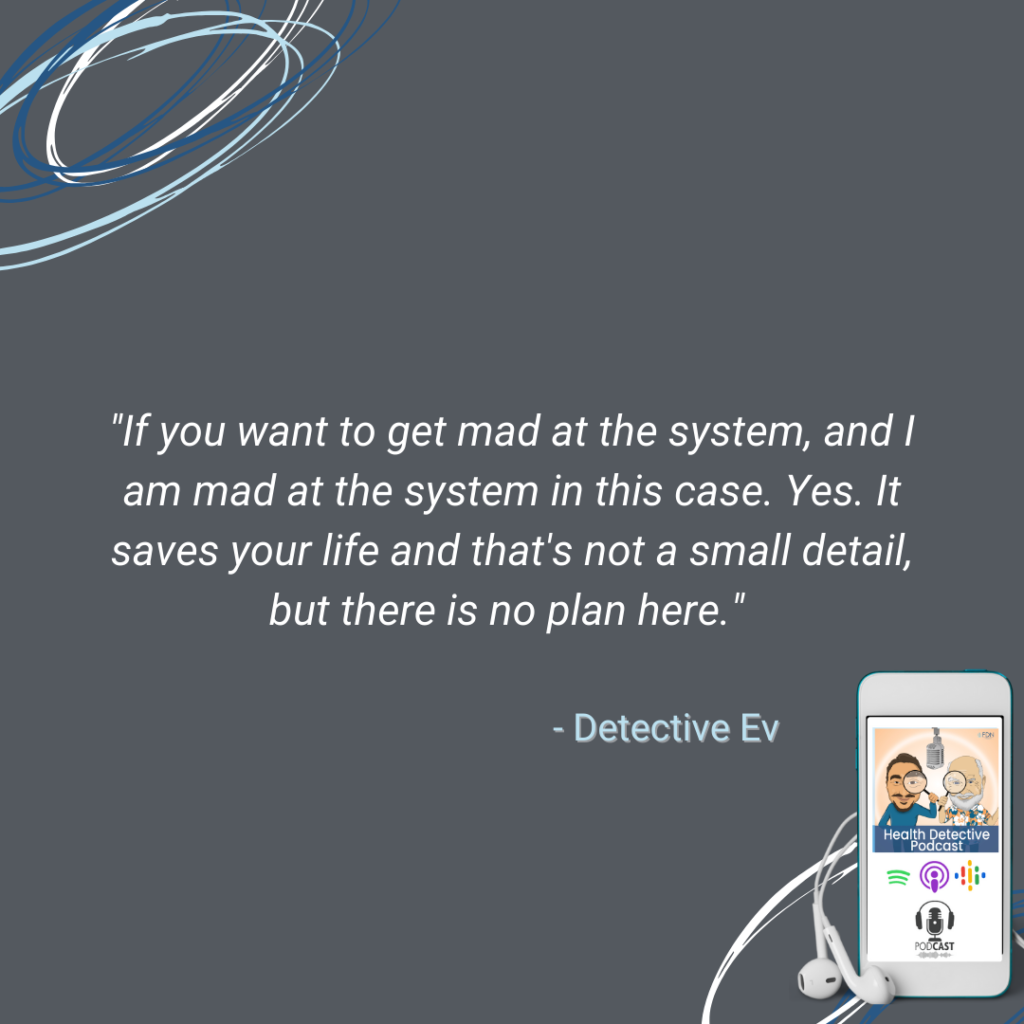
And yes guys, it does things wrong. But I try to think of people as opposed to the system. I know doctors, I’m sure you do as well. They’re usually amazing people that are doing this work to help others just like we do this work. If you want to get mad at the system, and I am mad at the system in this case. Yes. It saves your life and that’s not a small detail, but there is no plan here.
Saying disability for the rest of your life is not a plan, but that’s the system saying it, not the doctor. The doctor cares about you. That’s why they’re saying go on disability. Right? They’re not just handing that stuff out. I know that there’s some people that believe that it’s easy to get on that, that is not a particularly easy thing to get. There’s a lot of things that have to happen before someone gets disability.
Where do you even go after this, Nicole? One thing I actually haven’t established with you yet is, because you’re talking twenties, thirties, were you in the health space at all, or were you in a completely different field of work?
Sometimes Medicine is the Right Thing to Do
[00:16:42] Nicole Dube: I was in a different field of work. However, I had just finished my master’s degree in nutrition. So, I had started to do a little bit. I had been apprenticing with my nutrition mentor. She is a well-known nutritionist and had a thriving practice. I had been doing it, but I hadn’t gone out on my own yet. And I was in a different field of work.
To your point earlier about Western medicine or traditional medicine and how we kind of tend to just thumb our nose at that completely. I had to learn that myself, because I kind of did that in the beginning. I was all about everything natural and holistic, and I didn’t want to take meds, I didn’t want to do that.

But that’s what my body needed at that time. I had to get over that and realize that there’s a place for it. Sometimes it’s appropriate to use it and it’s okay if you do. I really had to learn that lesson in that experience.
[00:17:34] Detective Ev: Okay. I like to figure out people’s, we can call it a aha moment or whatever. You already had an interest in the nutrition side at the very least, you’re not actively doing it per se, work wise. But you have an interest in it more than the average person.
I’m kind of curious though, at what point does Nicole decide, realize, or whatever, that I got this diagnosis, cause that’s the main thing. When we’re suffering with extreme symptoms, as many of our guests have suffered with, you’re not necessarily thinking about the natural side or whatever. You’re trying to figure out what is wrong, what needs to be done.
Researching Mast Cell Conditions
Then once we get the diagnosis, especially when it’s a not so great one that really there doesn’t seem to be a solution to, that is when there’s a potential for someone to start maybe thinking outside the box or doing something else. When do you have the moment that you’re like, okay, wait a second. I’m now stuck with this thing. I’m being told to go on disability in a way.
When do you have the moment that you go try nutrition or functional stuff? Like how does that transition happen?
[00:18:30] Nicole Dube: It was actually right away. It was actually when I was in the hospital and I remember talking a lot to my nutritionist, my mentor. She was like, you know, I really think you need to look into this mast cell thing. I think it sounds like what you have.
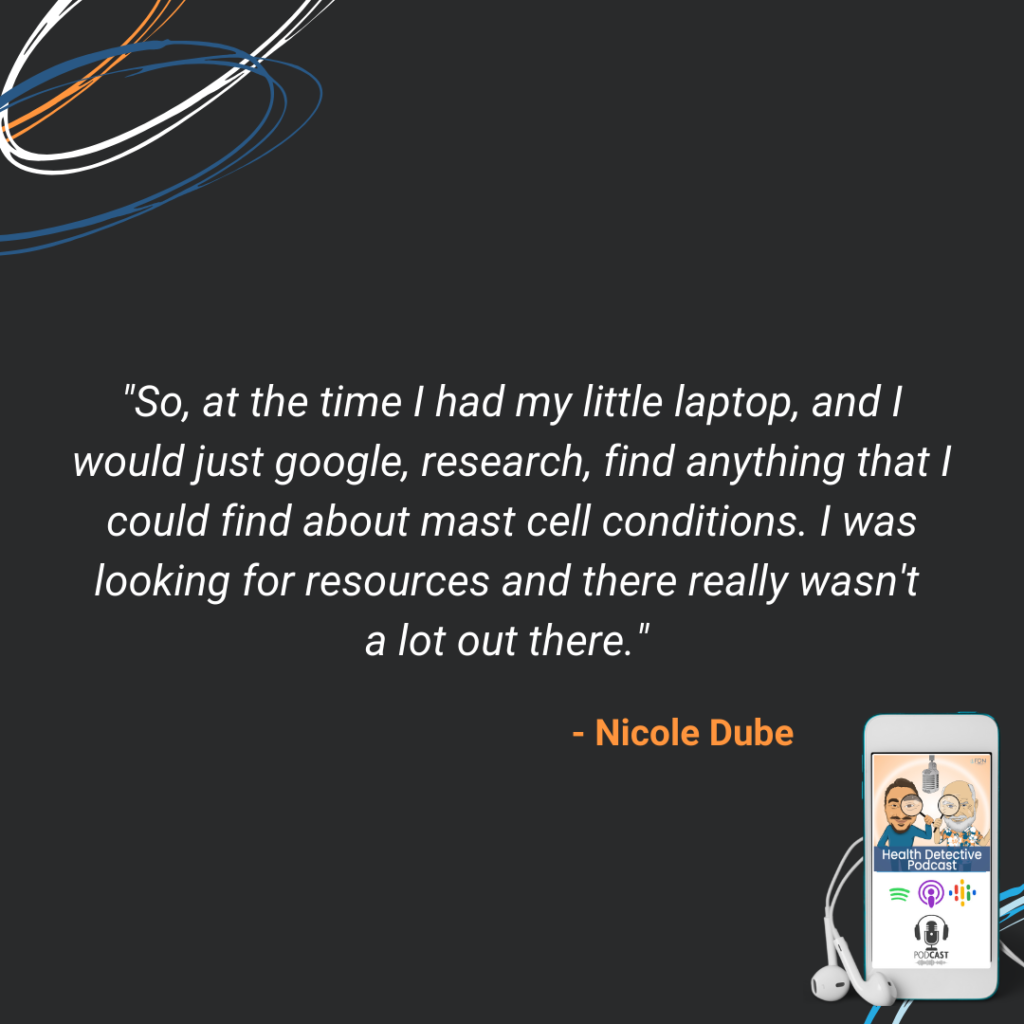
So, at the time I had my little laptop, and I would just google, research, find anything that I could find about mast cell conditions. I was looking for resources and there really wasn’t a lot out there. But there was someone, she was known as the low histamine chef in this world. Her name in that space, her name was Yasmina Ykelenstam.
I eventually hooked up with her and did a consult with her. She had Mast Cell Activation Syndrome as well. She sort of made her life’s work about it, about nutrition, and how to work with these conditions. So, I consumed everything I could find about it.
Starting with Diet
Then I just started my own sort of investigation with myself. I did a lot of different things. I started first with diet. I thought, okay, I can’t because I was down to, I think when I was out of the hospital initially, I was eating six foods and that was it.
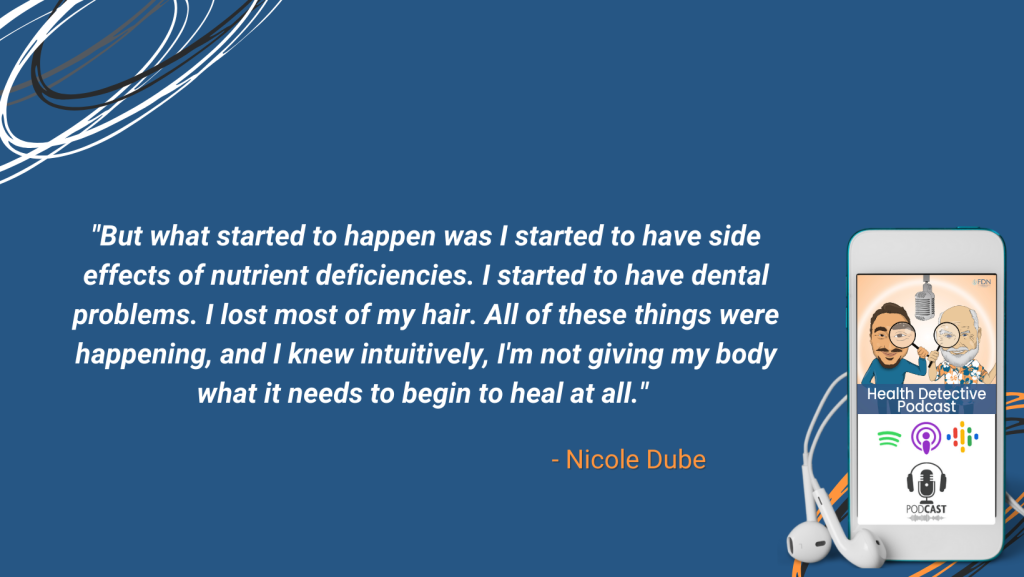
Your inclination, especially when you’re anaphylactic, is I’m going to stay in that little bubble. This is where I feel safe and I’m just going to stay here. I did that for a while. But what started to happen was I started to have side effects of nutrient deficiencies. I started to have dental problems. I lost most of my hair. All of these things were happening, and I knew intuitively, I’m not giving my body what it needs to begin to heal at all. Like, I had no fat in my diet. I had no greens in my diet. I was missing major nutrients.
At the same time though, I was anaphylactic. So, you can’t just start eating these foods. You have to desensitize your body and reintroduce them back in. What I started with was just a food journal and I personally hate doing them. They’re a pain in the butt, like they’re super devious.
But I wrote down everything I ate, when I ate it, what symptoms I felt, what meds I took, and started to look for patterns. Because as you know, from FDN, you can have a sensitivity to something, and it can show up the next day. Like, you could have a headache and it’s from the chicken you ate the night before.
Tracking Diet, Looking for Deficiencies, and Micro Dosing Nutrition Back In
I just started to keep really meticulous logs of what I was doing.
The next thing I did was I started to log my food into an app, and I think I used fitday.com at the time, but you can use something like Cronometer is really great. I know a lot of FDN folks like to use that. But what I would do is I’d look at my meals, look at the macros, look at the profile, and I’d look at what I was deficient in.
Then I would look for foods to reintroduce that was high in that nutrient. Say, for example, I was low in magnesium. I would look for high magnesium foods. I was very selective when I chose what food to work with to reintroduce. I would always go for really, really nutrient dense foods.

I mean, your inclination is, I’d like to have some chips back in my life or something like that. But I would instead, pick something like dandelion greens or something that would really give me a lot of bang for my buck. Then I would work with that food. I’d work to reintroduce it, micro dose, get my immune system to not tag it as a problem. It was painstakingly slow, but that’s what I did at first was just work on diet because I knew that I couldn’t sustain what I was doing.
I used the MRT test too, which I know we use in FDN quite a bit. It’s one of the five foundational labs that they use. I had actually been trained by Oxford Biomedical Labs to administer that test and interpret that test. I started to use it quite a bit, and in my practice too.
Utilizing the MRT with Mast Cell Conditions
My initial thought though, which was interesting, was, the clients I work with primarily have mast cell issues. I remember thinking, well, what’s the point of running this test on them? We’re releasing mediators 24/7. Like, it’s just going to always be red and yellow, and it wasn’t the case. It wasn’t at all.
I found that to be particularly helpful, then I just built from there. So, I just started with diet alone and just worked on expanding back out and getting some nutrients back in. Once I started to do that, I started to immediately feel better. So, that was my first step was diet.
[00:22:25] Detective Ev: I don’t know if you realized this, but you read my mind. I was about to ask about the MRT thing. I’ve been wondering that since you mentioned that it was these mediators coming out. I’m like, okay. I wonder what this looks like actually on the test.
I’m fascinated by this cause you said you would assume that everything would just be lit up, but that wasn’t the case. The MRT, good science behind it. I’m kind of wondering here, are you noticing an inconsistency? Because you could only eat so many foods. Like, is there problems like inconsistencies with the MRT?
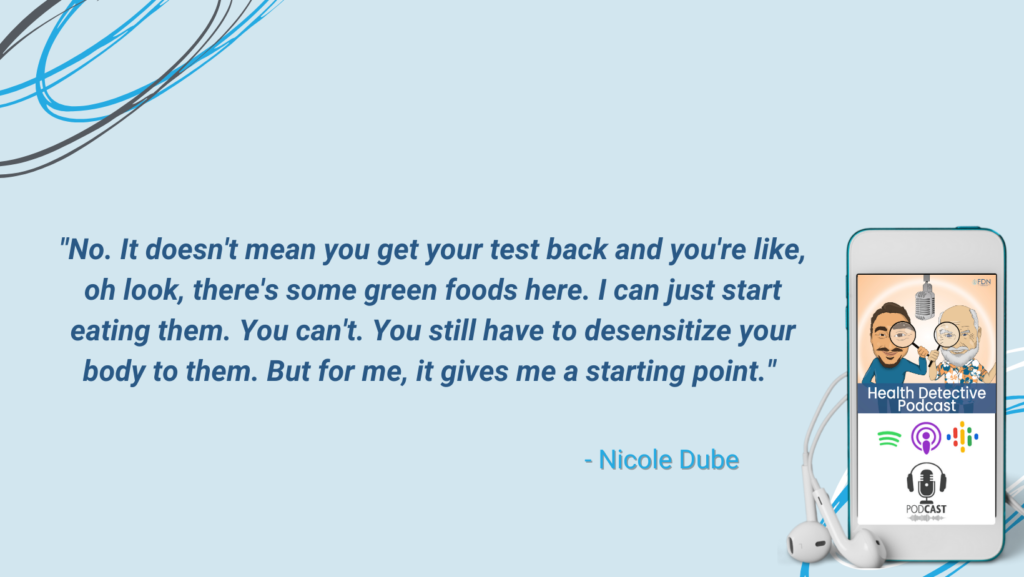
[00:22:57] Nicole Dube: No. It doesn’t mean you get your test back and you’re like, oh look, there’s some green foods here. I can just start eating them. You can’t. You still have to desensitize your body to them. But for me, it gives me a starting point.
Questions About Using the MRT with Mast Cell Clients
I know if we’re going to work on reintroducing foods and apple is a red food for you, we’re not going to try that. Whereas if apples are green, we’ll start with apple and it might go faster than something else, you know? It doesn’t mean that you can just start eating whatever, any green food that’s on there.
For me, I found that it’s a good starting point of, know where to focus. You still have to desensitize yourself to it, which I know sounds a little bit weird.
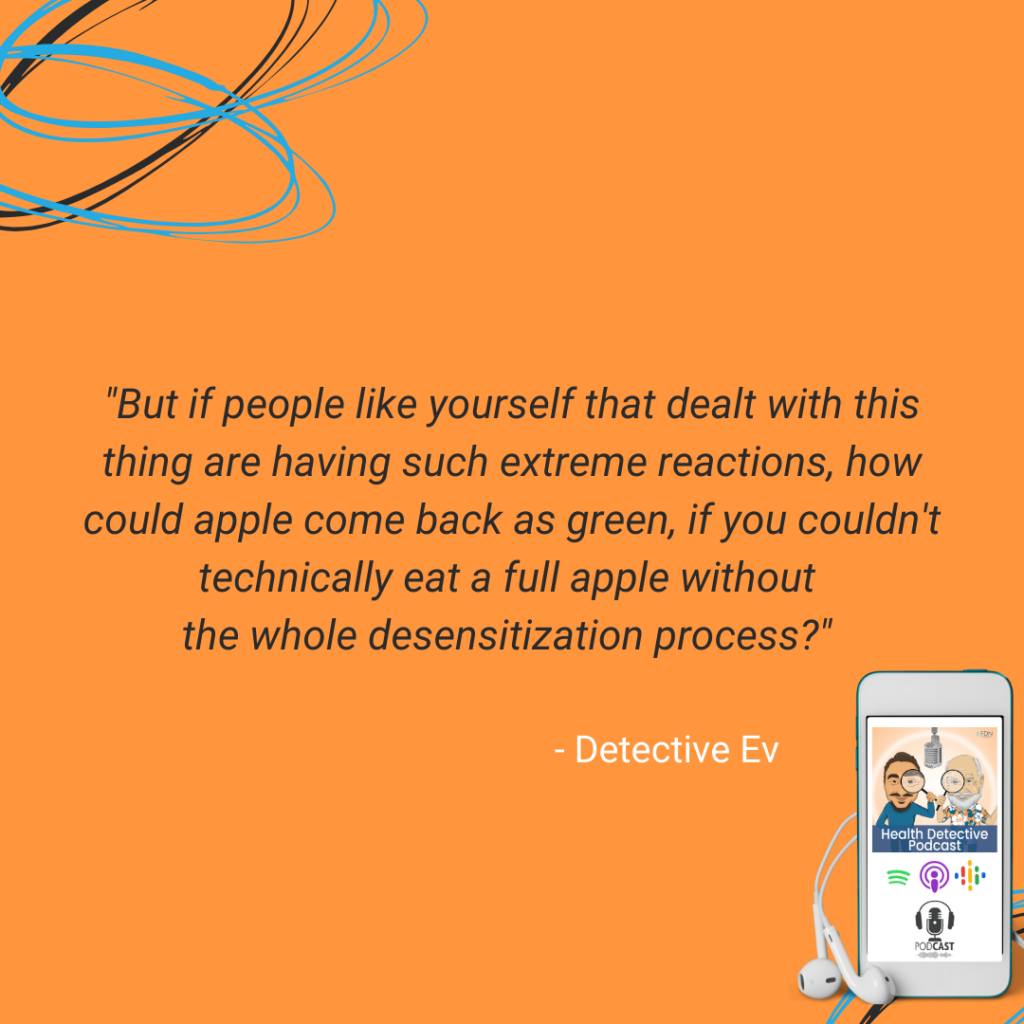
[00:23:33] Detective Ev: Okay. So, what I’m trying to figure out then is, because the MRT, again, very good test. I’ve talked about it a million times on here. People know I love it. But if people like yourself that dealt with this thing are having such extreme reactions, how could apple come back as green, if you couldn’t technically eat a full apple without the whole desensitization process? Like where is the inconsistency there? And it’s not literally an inconsistency, but why does it appear to be that way?
[00:23:57] Nicole Dube: Yeah, I think that it’s just your immune response is so hyper regulated that I don’t have a good scientific answer for you. You’re asking, why aren’t they finding that mediator release? And I don’t have a good answer for that, for as to why that is.
[00:24:12] Detective Ev: Fair enough. I like people that could do what I attempt to do, was just like, hey, I didn’t know about mast cell. Right? I’ll ask about it. Then we don’t know that. So now we have something fun to study after this podcast. And if I figure it out, I will let you guys know in a subsequent episode. Not important.
Using a Mediator Release Test with a Mediator Release Condition
I kind of was thinking though, that, because you had mentioned at one point, not only could the mast cells, I think you had said that there could be like a normal response, but there’s more of them than you would expect. And I’m kind of wondering if maybe that’s where the line gets drawn. Because if they’re just measuring the severity of the reaction, well, whatever, now I’m getting too much into the weeds.
I apologize. Next topic. Right?
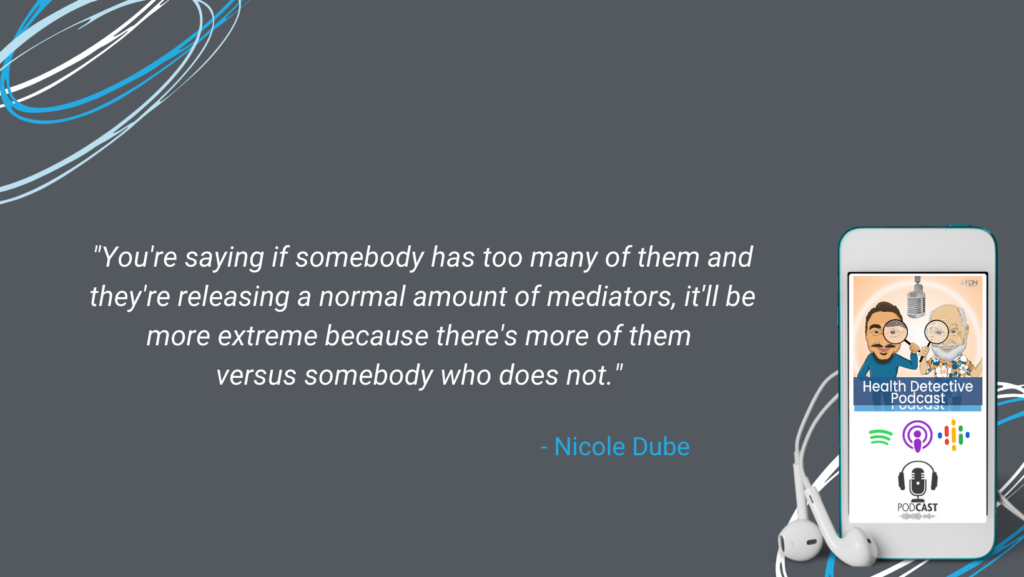
[00:24:45] Nicole Dube: You’re saying if somebody has too many of them and they’re releasing a normal amount of mediators, it’ll be more extreme because there’s more of them versus somebody who does not.
[00:24:55] Detective Ev: Based on the limited information that I have from this podcast, that’s my theory. We’ll see if that works out to be true one day. I’ll hit up Oxford. They’re great people, they’ll answer too. That’s the best part.
So, knowing what you know now, having gone through FDN, would you have started with just the diet stuff? Because I know FDN is a system, and this is a particularly kind of crazy case. I mean, it’s extreme. Like, would you do the exact same thing that you did, or would you run all of the labs that we’re supposed to run right from the get-go on someone like you?
Laying a Good Foundation Before Attacking Complicated Pieces
[00:25:24] Nicole Dube: I tend to run labs with the people that I work with, but I do start with diet first. Say, for example, everybody has different pieces to their puzzle, right? Hormones can be a huge piece. So, I always will run a Dutch. You know, gut dysbiosis can be a huge piece for people. There can be underlying pathogens like SIBO, parasites, Candida, all that kind of stuff. I will run that to see what the landscape is for the person.
But I always start with diet first, and start with getting their mast cells stabilized, whether it’s through pharmaceuticals that they’re taking or it’s through natural alternatives. Cause there are some alternatives to the medications. They have to be in a stable place before we go after any of those other things, because then they won’t be able to tolerate that. I want to make sure that they’re stabilized first.
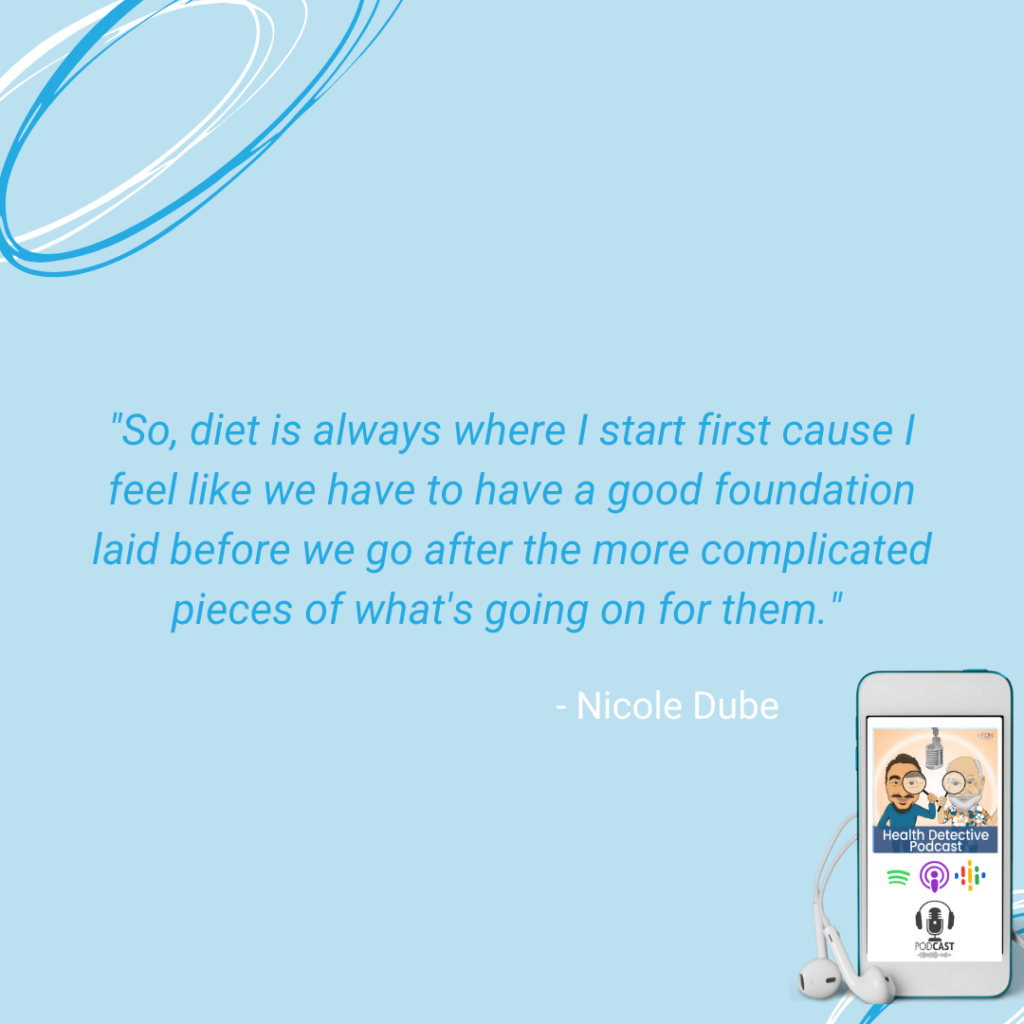
They have a good, healthy diet going on and that their detox channels are open before we do any of that work. That they have a binder on board if we’re going after a pathogen. So, diet is always where I start first cause I feel like we have to have a good foundation laid before we go after the more complicated pieces of what’s going on for them.
[00:26:31] Detective Ev: That makes sense. Cause I was wondering, I’m like, so many of the test results, even though it’s not just clearly what we do here is not run tests and then use supplements, but it’s a part of some of the tests.
In a Much Better Place with Mast Cell Activation Syndrome
I was wondering, well, if these people are reacting this extremely to otherwise normal things, there’s people that react to the gut supplements all the time and they’re otherwise non-reactive to those things. So, I figured that might not be always the best bet. What you described makes a lot more sense.
And I usually would save this for the end, but I’m so curious, and there’s got to be other people that are wondering right now, I mean, you seem like you’re in a much better place, so where are we at now? How long did it take to get here? And like what is here?
We’re not looking for perfection on the show. Very few FDNs are at that, but you seem like you’re doing better.
[00:27:11] Nicole Dube: Oh, yeah, for sure. And you know, it’s funny, I had a health coach hit me up once who also had a mast cell issue. I remember her asking me, well, how many foods can you eat now?
And I can’t remember what I told her. It was like 30 or something at the time. She said to me, well, I don’t consider that healing unless I could eat anything I want, and I was the way I was before. It’s like, well, you’re probably never going to get there. I think people have this idea that healing means perfection or getting back to where you were. For me, it doesn’t mean that.
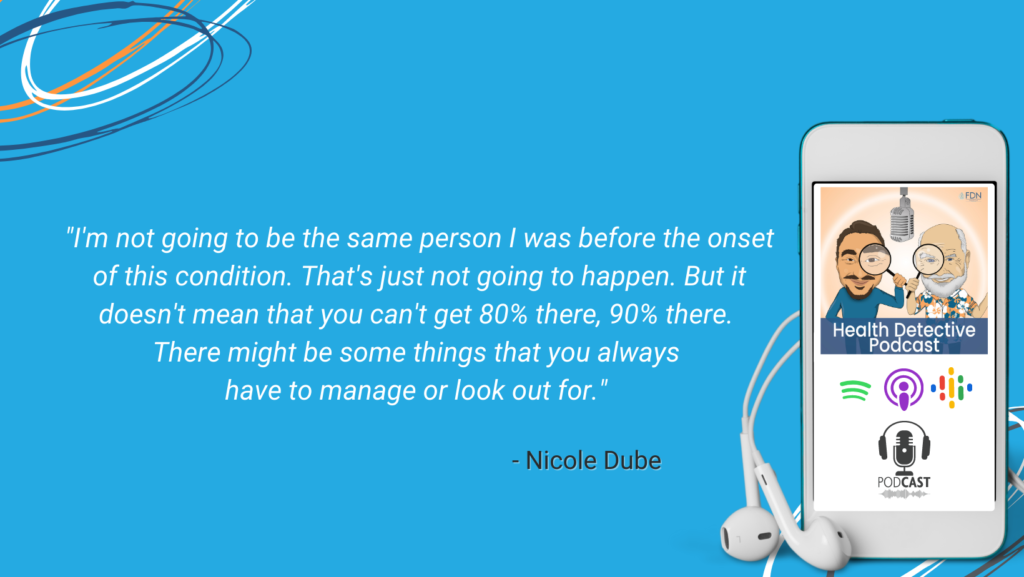
I’m not going to be the same person I was before the onset of this condition. That’s just not going to happen. But it doesn’t mean that you can’t get 80% there, 90% there. There might be some things that you always have to manage or look out for.
Balancing Hormones Was a Key Piece to Propelling Forward
For me, it’s been almost 10 years, so this has been a long journey for me. The first couple of years were not good. I was just sort of managing symptoms and not really progressing like I like to. But I would say over the last five years, I really gained a lot of traction. And doing the FDN course helped me quite a bit with the functional lab testing, getting proficiency in that, and using that on myself too, to find pieces of the puzzle.
For example, I absolutely love the Dutch test now. I learned how to utilize it through FDN and because there’s such a relationship between estrogen and histamine. For me, it was a huge piece of my puzzle that I never really paid attention to before, which sounds kind of stupid. But hormone balance was key for me. You know estrogen can cause a histamine release.
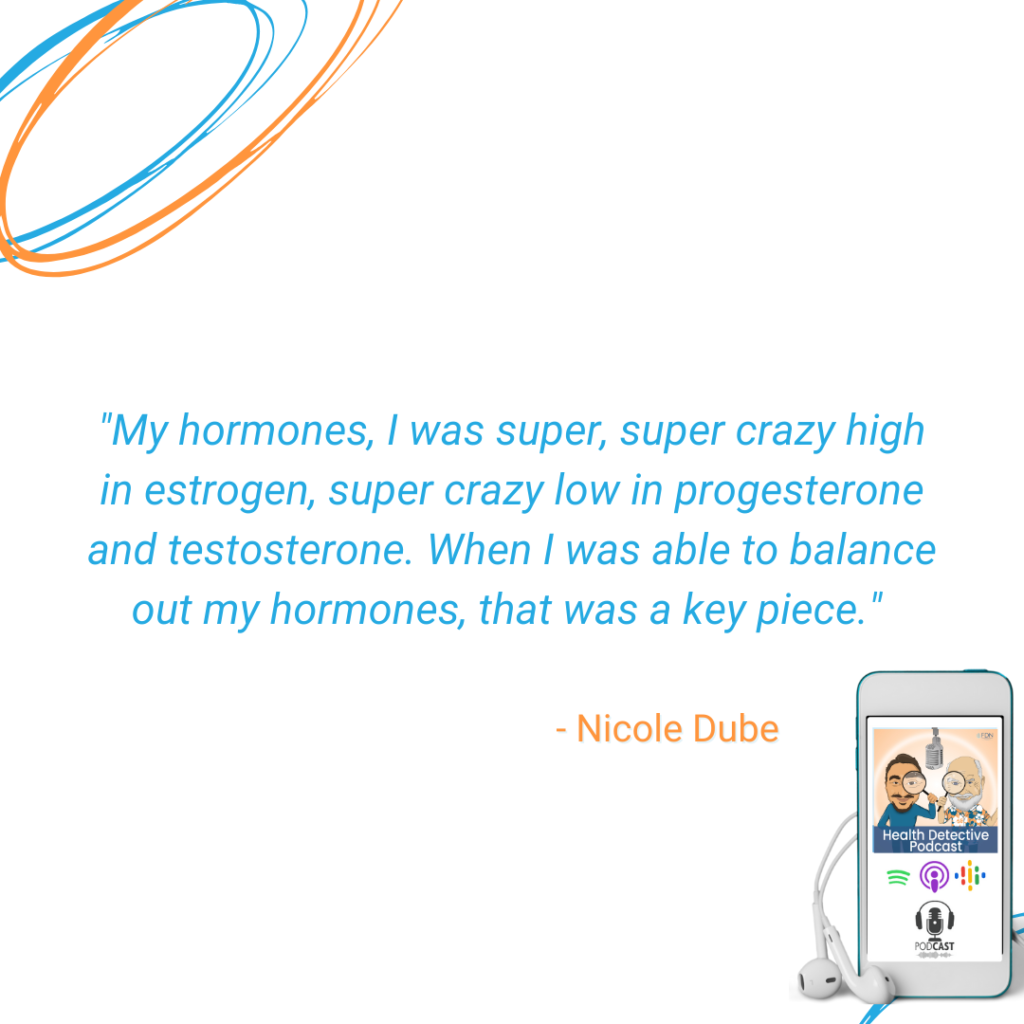
In contrast, progesterone is a mast cell stabilizer. It helps boost your DAO, which helps break down dietary histamine. My hormones, I was super, super crazy high in estrogen, super crazy low in progesterone and testosterone. When I was able to balance out my hormones, that was a key piece. There were different steps along the way for me, that really propelled me forward. Yeah, I’m super high functioning and happy and it’s good.
[00:29:02] Detective Ev: That’s what matters.
I like these stories and I appreciate your honesty because we want to give people realistic expectations. And considering where you were at to be able to get to, I mean, I’m saying hypothetically even 50% better would be life changing. But to 80%, 90%, to know that that’s something people can aspire to. And I’m in the same boat, you know?
Working Up to Your Best
There’s certain things that I have to maintain in my life to have this level of health. One of the weirdest ones is, even though most people, especially my close friends, they know me as this nut cause I work all the time. But I’m really strict with the sleep. I can go the 12, 14 hours a day, doesn’t bother me.
I run my labs. Ironically, I’m completely good. Cause I like what I do, and I’m calm when I do it. But the minute I decide that I’m going to go to bed past 10:00 PM, I feel it the next day. You can give me seven days in a row of 12 hours a day. Totally fine so long as I went to bed at like 9:30, 9:45. If I go to bed at 11:00, I will literally feel that the next day. And it’s the funniest thing coming from a 26-year-old. But that’s how it is.
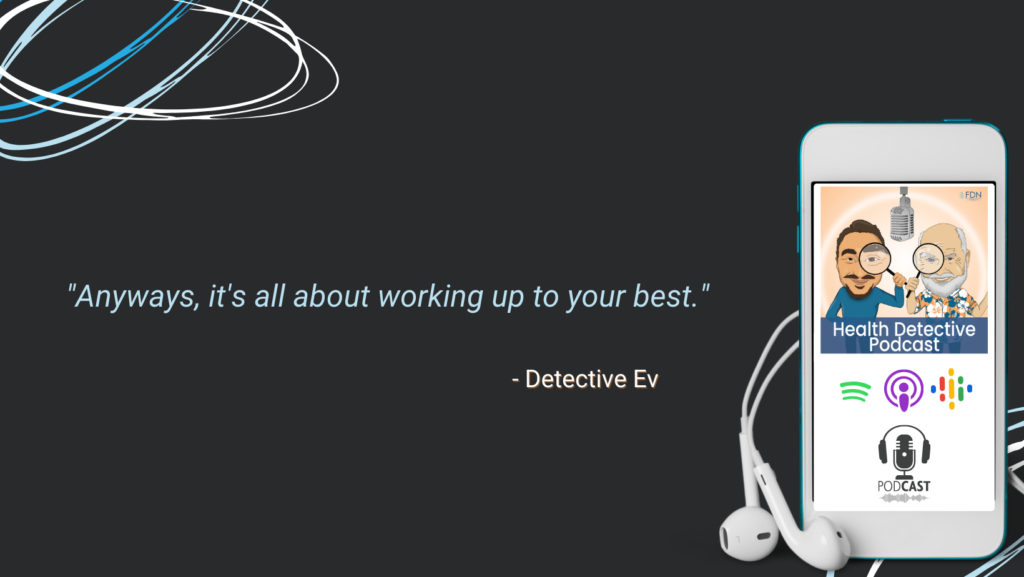
I don’t want to drink alcohol anyway, but I don’t do that. I think that’s to my advantage because even people that have just a few drinks per week, I mean, alcohol is a toxin. I don’t know that the benefits that red wine gives could not be obtained from somewhere else without the downside that comes from the alcohol. Anyways, it’s all about working up to your best.
Know Your Triggers with Mast Cell Conditions
And if, God forbid, you are someone listening to this podcast that has not gotten to a severe state of health yet, one of the smartest things I think you could ever do, and it would take such a special person to be able to do this, I know very few of them. But to be able to see consequences of your current actions before they actually exist and then maybe make your life a little more disciplined now. This is my theory, just from being in the space for over eight years, FDN for five.
I genuinely believe that people that are healthy right now and willing to do some of the health stuff before it’s a necessity, they can probably go back and forth and eat the cheese steak and the gluten cake at Thanksgiving for the rest of their life. I honestly think they’re going to be okay.
But once you, again, oversimplified, but maybe like activate these pathways, you could call it, whether it’s auto immunity, mast cell, whatever, that seems to be more on the permanent side. You can get better, but there’s going to have to be some regulation there.
So, let’s avoid it. Let’s be smart enough to avoid it before it ever happens.
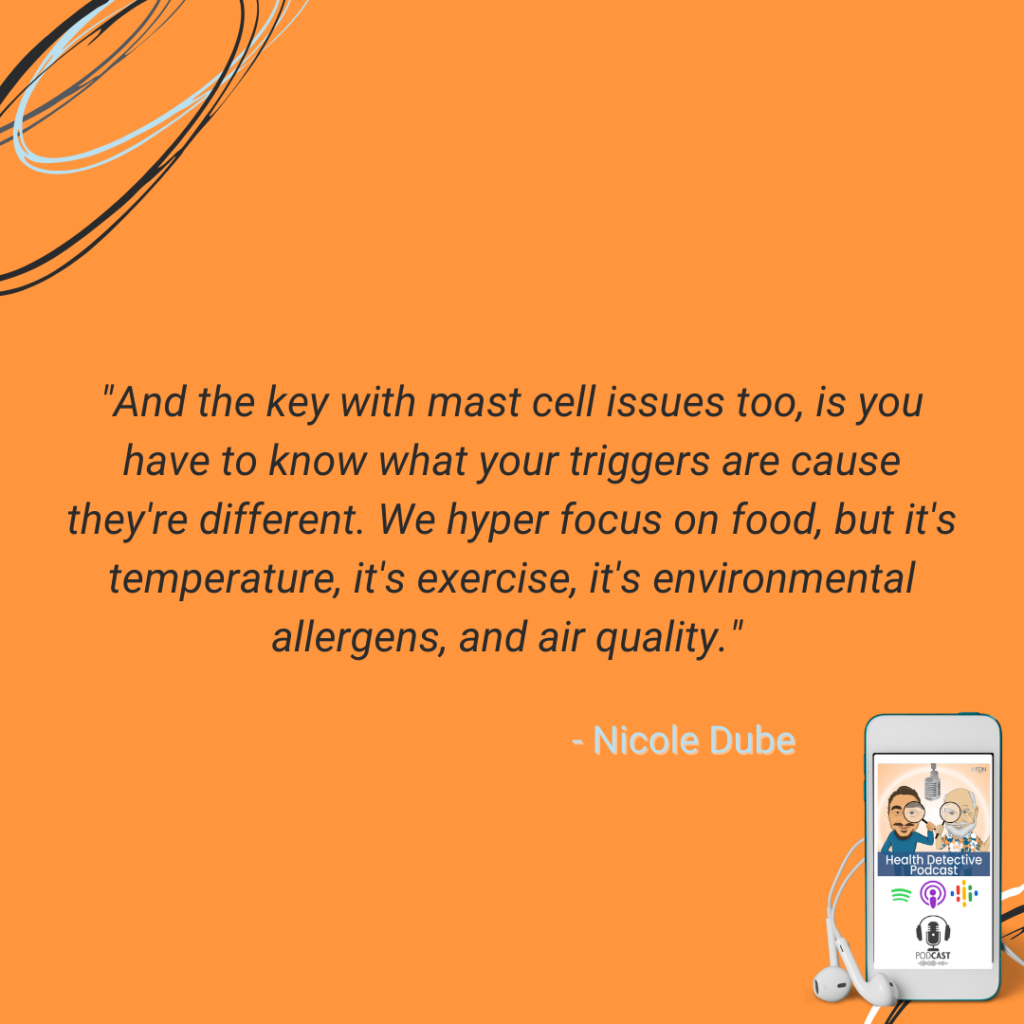
[00:31:06] Nicole Dube: Exactly. And the key with mast cell issues too, is you have to know what your triggers are cause they’re different. We hyper focus on food, but it’s temperature, it’s exercise, it’s environmental allergens, and air quality. All of those different things can trigger you. For me, I know what my triggers are, and I just try to avoid them. I know what’s going to bother me and what isn’t, so I can plan for that.
Commercial Break – Try the FDN Course for Free
[00:31:30] Detective Ev: Hey there folks. It is Detective Ev popping in here really quick. If you’re listening to this story and thinking, wow, wouldn’t it be kind of cool to be able to help people like Nicole out there that are suffering with these health issues, you are in luck. You absolutely can.
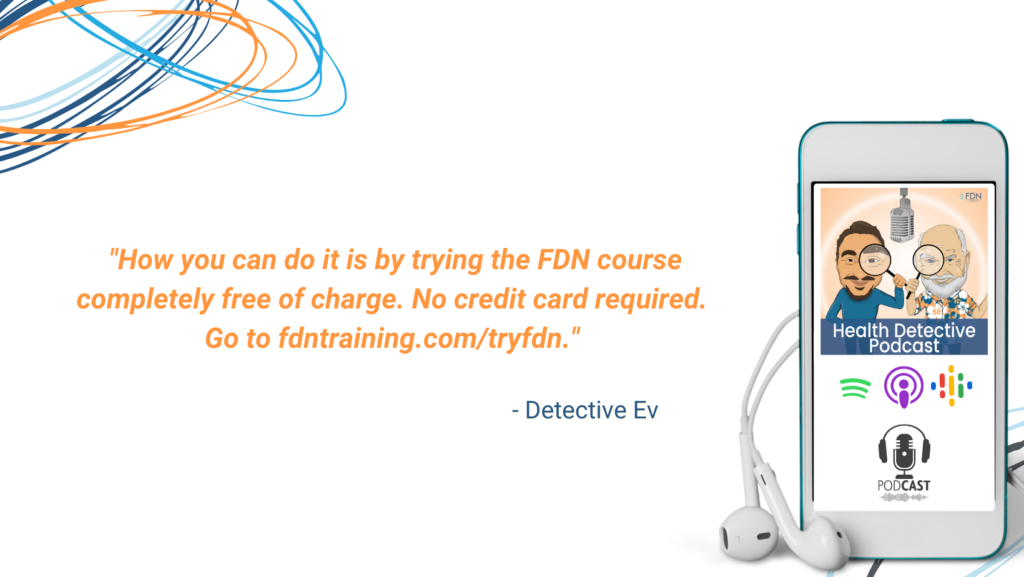
How you can do it is by trying the FDN course completely free of charge. No credit card required. Go to fdntraining.com/tryfdn. That is fdntraining.com/tryfdn.
All right. I won’t annoy you guys anymore. Back to the episode.
The FDN System Works No Matter What the Root Cause
Okay. The one thing I wanted to ask before we get into more, cause I want to talk about some FDN stuff as well, in the terms of you going through the course and now being a mentor. But the one thing I was wondering is, I know that in FDN sometimes you’re lucky and you can find the root causes.
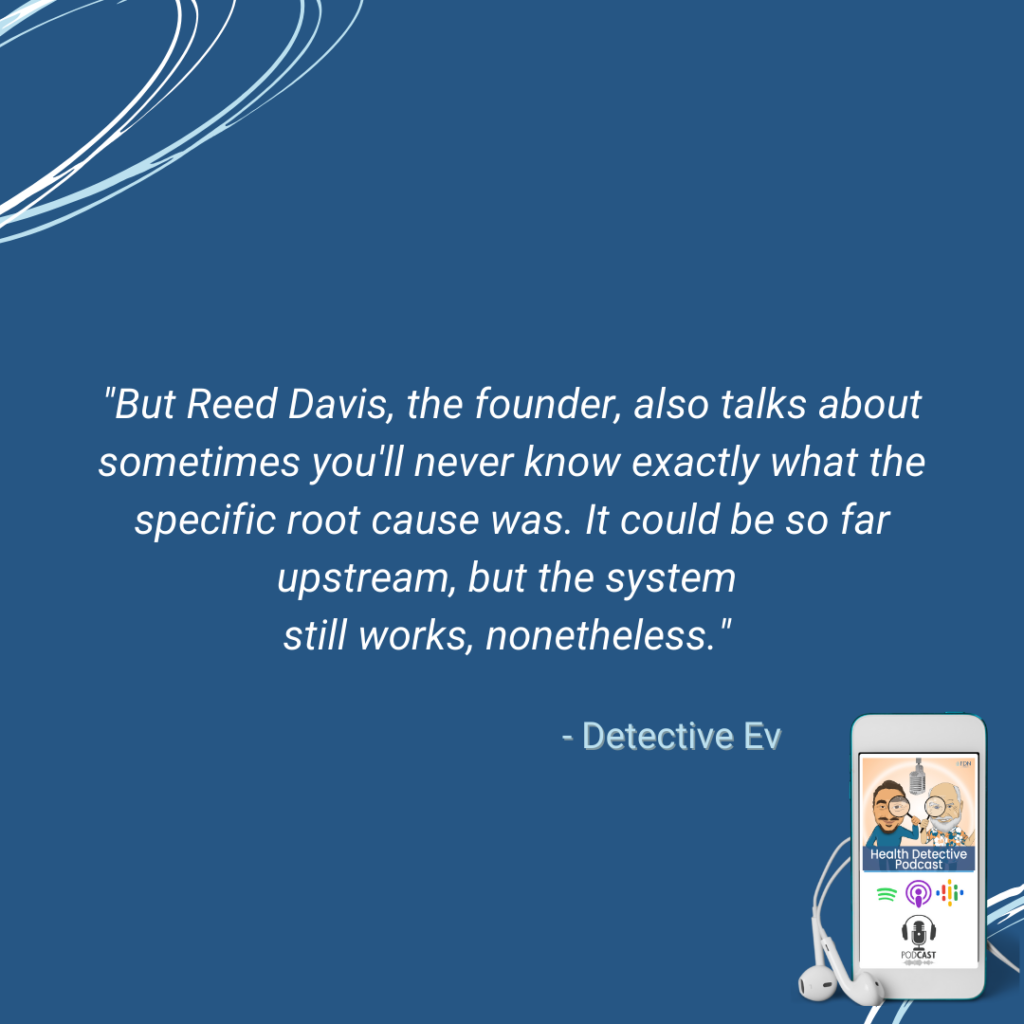
But Reed Davis, the founder, also talks about sometimes you’ll never know exactly what the specific root cause was. It could be so far upstream, but the system still works, nonetheless. So, it’s not always important, but of course it’s satisfying for people to know this is what led to this.
What’s the theory, belief, behind why this happened to you? Because I know in the beginning when you were telling your story, at one point you had mentioned that you had a vaccine administered to you and it led to this.
So, guys, by the way, oh my God, I shouldn’t have to say this, but this is not an anti-vaccine thing. Vaccines are medications if people didn’t know. Every medication known to man has side effects. The fact that like, some people believe that, don’t, just don’t. No one said don’t take them. But they have side effects just like anything else. It’s kind crazy that we think that that’s not possible.
So yeah, what’s caused this?
[00:32:53] Nicole Dube: It’s so funny you said that. Cause when I initially was telling my story and mentioned vaccines, I thought, well, maybe I should say it’s not an anti-vaccine.
Mast Cell Conditions Can Be Secondary to Other Triggers
For me, I want to be clear. The vaccine triggered the onset of it, it didn’t cause it. There’s a difference between those two things.
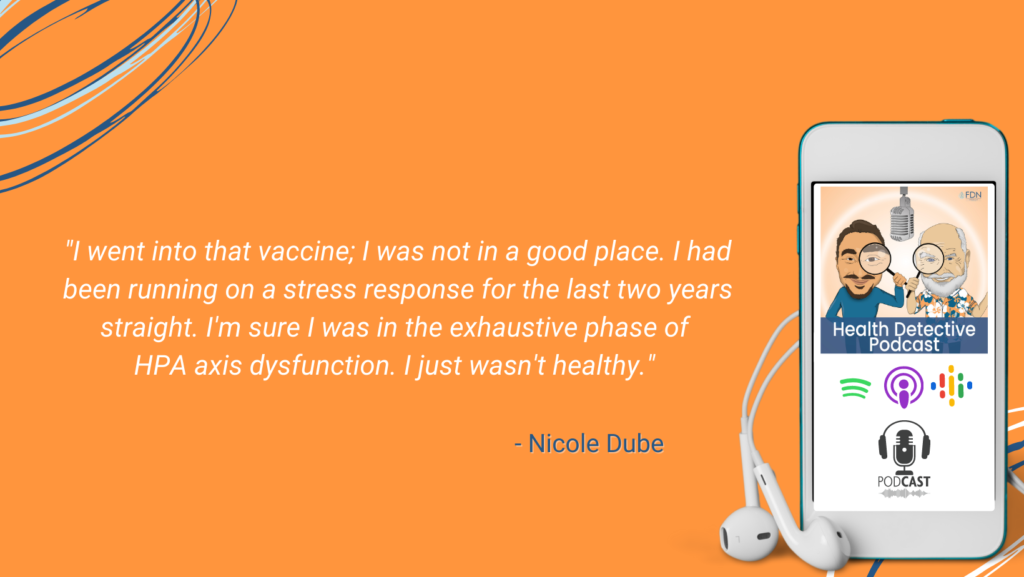
I went into that vaccine; I was not in a good place. I had been running on a stress response for the last two years straight. I’m sure I was in the exhaustive phase of HPA axis dysfunction. I just wasn’t healthy. I’d gone through some traumas in the couple years leading up to it. I wasn’t in a good place when I was in front of the doctor and got the vaccine. So, I think it just was the trigger of it.
Now some people have the genetic components for a mast cell condition, for some people, Mast Cell Activation Syndrome is secondary to something else. A lot of times what I have found, it’s Lyme, it’s microplasma, it’s mold toxicity, it’s those types of things. And if you can manage that and heal those underlying conditions, it calms down.
Like, for example, for me, POTS was secondary to the Mast Cell Activation Syndrome. Once I got my mast cells calmed down, regulated, and balanced, then the POTS went away.
So, I think it depends on the person. For some people, it’s a secondary thing. You know, I’ve seen a lot of people with Long Haul COVID who now have mast cell activation type things going on. It could be secondary to the virus that they just dealt with. So, it just depends on the person. For some people it’s genetic and that’s what it is. But it just depends on the person.
How Well the Body Deals with Trigger-Burdens
[00:34:26] Detective Ev: Got it. I’m noticing, again, this is a very ignorant take because I’m just learning this today. But it almost seems like COVID, Lyme, a vaccine in your case, these are the final triggers per se. But it almost seems like the mast cell could be activated commonly by things that create quite a burden for our immune system like a vaccine, like COVID, like Lyme.
Then you mix in the other lifestyle factors, final straw. Yeah, we’re going to react to everything because the world’s dangerous and we need to protect this host. Right?
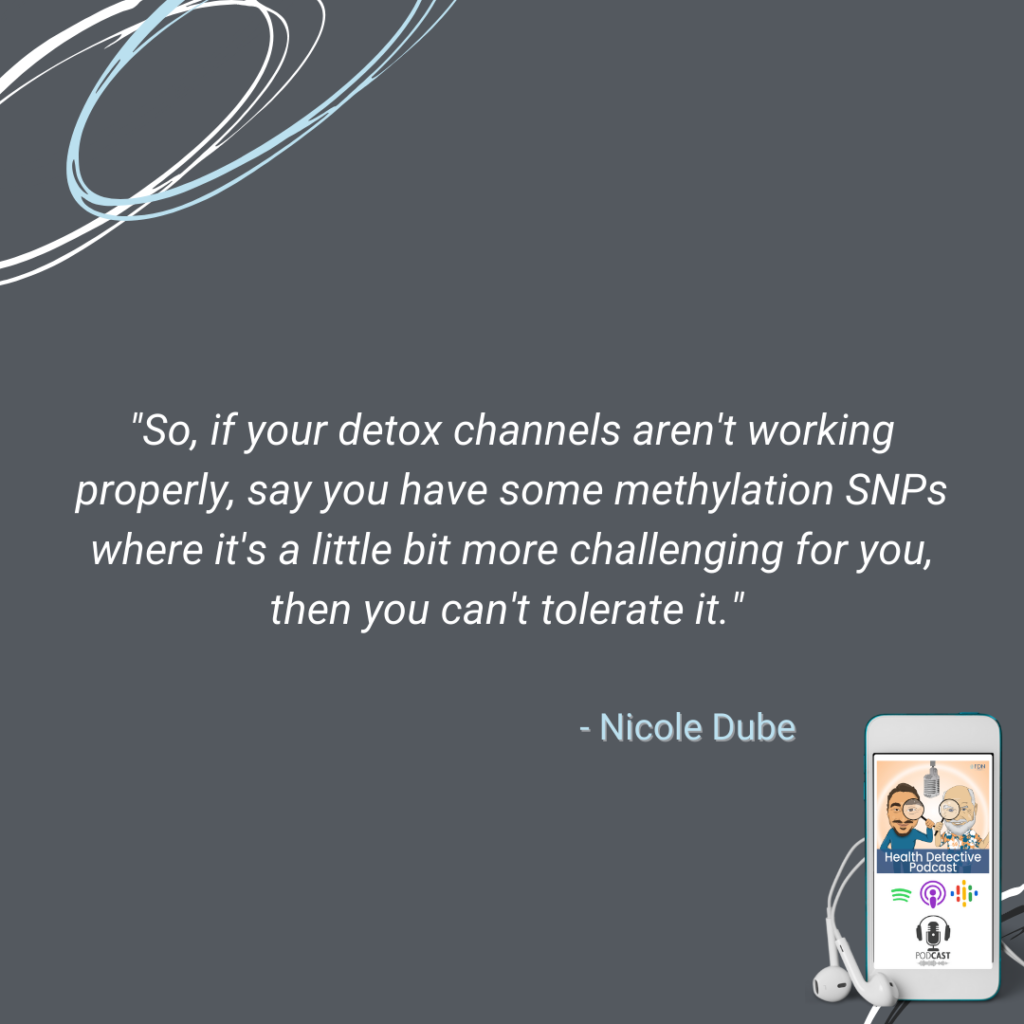
[00:34:55] Nicole Dube: We have to look at too, they’re heavy burdens. But it depends on the person’s ability to handle those burdens. So, if your detox channels aren’t working properly, say you have some methylation SNPs where it’s a little bit more challenging for you, then you can’t tolerate it.
I think that’s where the vaccine injury piece comes in and those other types of things. I think it just depends on your body’s ability to handle the toxic burden that you’re putting it through with those things.
[00:35:21] Detective Ev: Well, this has been great. I want to transition a little bit to FDN itself. Cause most of the people that are listening to this are either interested in working with someone from the FDN world. We’ll shout out your business at the end as well. Or two, they’re considering the course and they just want to know more about it.
Doing FDN to Self-heal and To Help Others Heal
Did you go through the course to self-heal solely or did you kind of know you wanted to do this? Because I know that obviously you were looking for self-healing components. But I’m curious as to whether or not that was the only goal. Cause that was my only goal at the time. Then here I am doing the podcast. Right?
But for you, I’m curious, what was the perspective going in? Did you know you wanted to do this work?
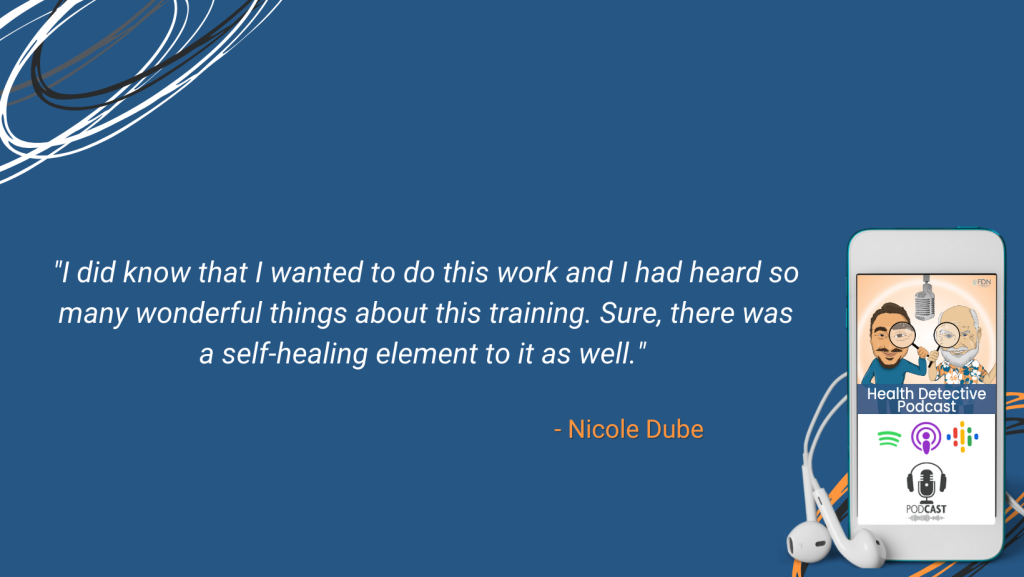
[00:35:58] Nicole Dube: I did know that I wanted to do this work and I had heard so many wonderful things about this training. Sure, there was a self-healing element to it as well. I’m always interested in finding things that will help me advance more with my health. But it had such a wonderful reputation. I’d known a few people that had gone through it themselves and just spoke really highly of it. Being able to be trained in functional labs was a huge draw for me. That’s why I wanted to do it.
[00:36:25] Detective Ev: Okay. So, when you went through the course, and listen, you’re more than welcome, please be honest about things that you think could be improved, things that you loved. It’s all good. Did the course meet your expectations? Did you like the mentorship? Did you like how things were done? I’d love to know about your experience so others can kind of get a feel for what it’s like to go through it.
[00:36:40] Nicole Dube: Sure. I loved it. It was actually the best training that I’ve ever done, and I’ve done quite a few.
Loving the FDN Course Training
I think I mentioned this to you earlier. What I liked about it is FDN makes you work for it. They don’t just give you the certificate. You don’t just watch modules, maybe take a quiz, it’s easy, you pass through, then you get your certificate.
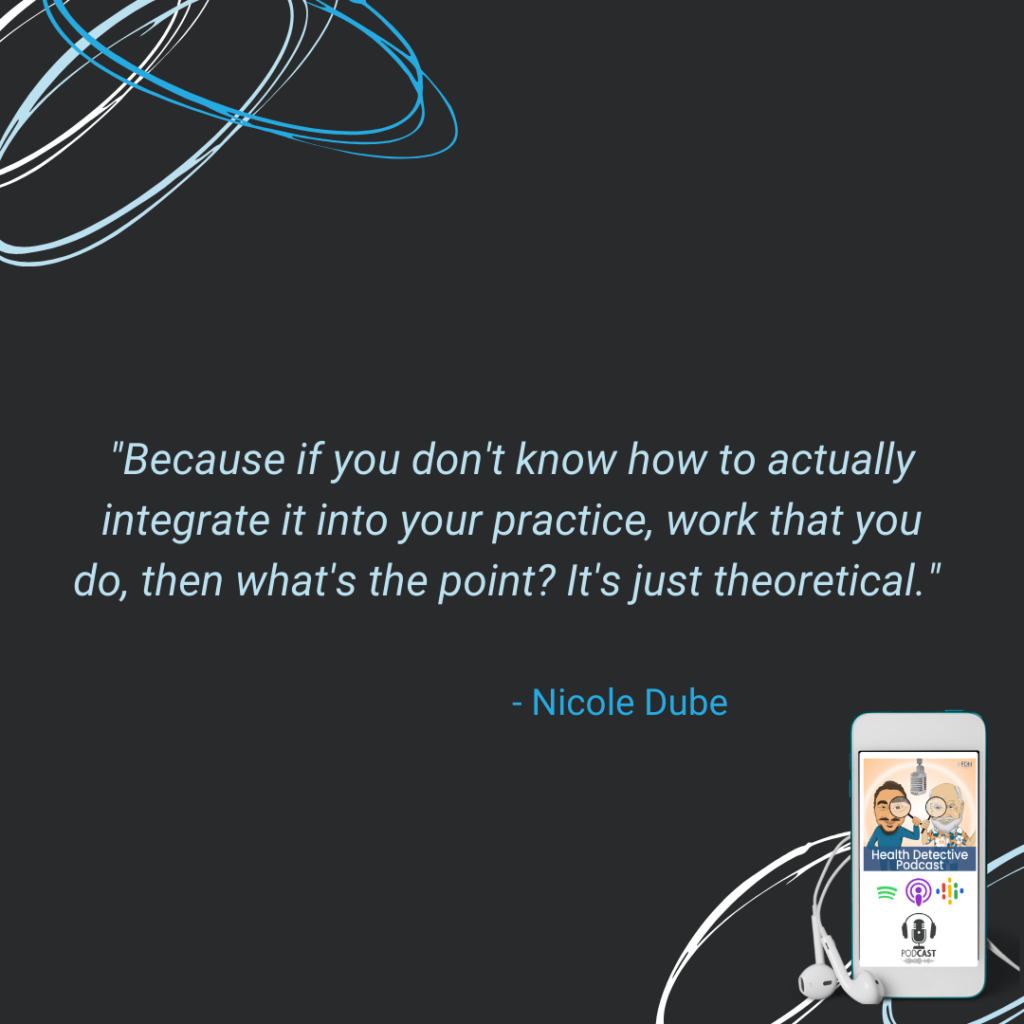
I loved that you guys incorporated practical exercises where you would actually have a mentor who helps you through the program. You role play, you interpret labs together. You interpret your own labs and then clients’ labs. FDN really makes sure that you understand the material, but also that you know how to apply it. Because if you don’t know how to actually integrate it into your practice, work that you do, then what’s the point? It’s just theoretical.
So, I really loved that you guys really train people hard. You make sure that they know what they’re doing before you let them out into the world as an FDN. I really appreciated that, cause not a lot of trainings do that. I’ve been through trainings and I’m sure other practitioners have as well where I’m at the end and I’m like, I want all of my money back. Like, this was not worth it, you know? This, I didn’t feel that way. I loved this training. It was fantastic.
[00:37:48] Detective Ev: That’s awesome. I laughed a bit when you said that it’s the best one that you’ve been through. Cause I was recalling your bio and how much you have done. So that’s saying something, that’s great.
An Ongoing Relationship with FDN
Yeah, the FDN course, I mean, when you’re obviously involved with the company, then I don’t know if anyone truly believes you. But I always say, I would’ve paid the cost of tuition just to have access to AFDNP. I mean, guys, we’re talking about things that are serious. Like it’s health issues.
These are the people, the people that are mentoring in the FDN course. They’re not famous. They’re not names that you’re hearing about everywhere. These are the people that I would go to and have a family member work with if a family member, God forbid, was diagnosed with cancer. They’d be working alongside the oncologist with my family member, because that’s how much faith I have in them.
And I can go into a group any day of the week, Saturday, Sunday, too. I can type in a question, whether it’s about something with business, which is also kind of interesting. I could ask, hey, I need to scale. I have three employees. Has anyone done that? Or, I have this very complex condition. I’ve never even heard of it; a client came with it. Oh yes. I’ve heard of that. This is what this is. And they got all these links for you and stuff. It’s a really special place.
The training itself, I mean, you go take on two clients, you make the money back. And they’re happy to pay you that money because you’re the first person that was actually able to help them.
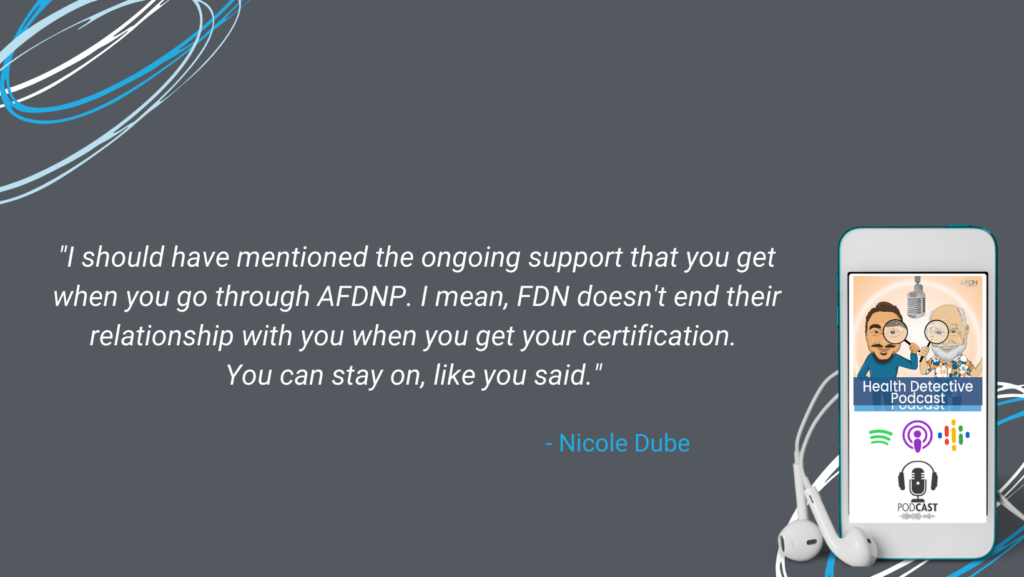
[00:38:55] Nicole Dube: You’re so right. I should have mentioned the ongoing support that you get when you go through AFDNP. I mean, FDN doesn’t end their relationship with you when you get your certification. You can stay on, like you said.
The AFDNP Community
There’s training webinars every week, there’s case studies. If you have a really difficult case, you can bring your case to the clinical advisors and mentors and present it. They’ll help you troubleshoot. There are private Facebook groups where you can ask clinical questions of your peers.
There’s so much that you can do going on and there’s so much support from the FDN community that you’re really never on your own. I mean, it’s really fantastic. I’ve never seen anything like it in any other training that I’ve had.
[00:39:36] Detective Ev: I agree that it’s not the end of the relationship. In a sense it’s almost the beginning.
Cause now you’re in a different world because the AFDNP thing is voluntary in the sense that everyone that’s an FDN goes through the FDN Facebook trainee group. And that’s a special place. I like that I’m involved with that because I still get to post some encouraging comments or just give some insight every now and then.
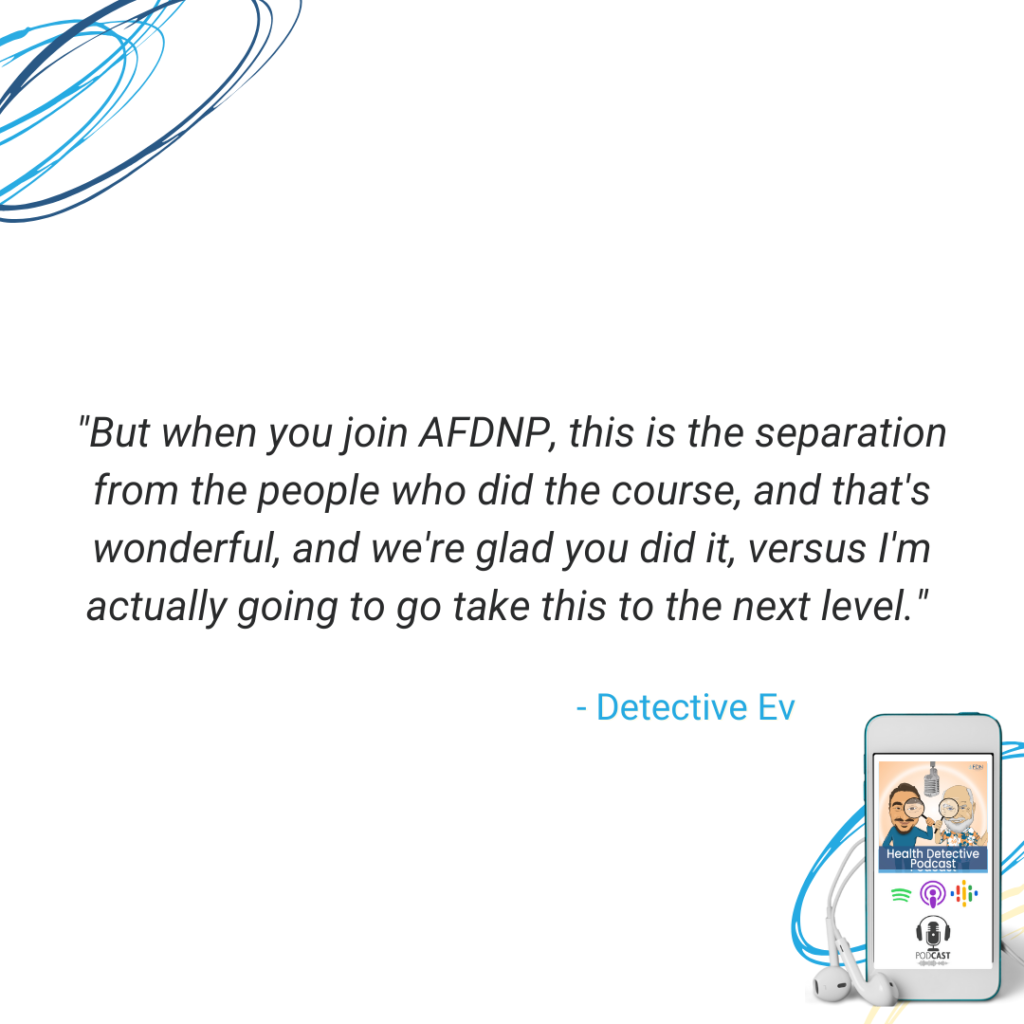
But when you join AFDNP, this is the separation from the people who did the course, and that’s wonderful, and we’re glad you did it, versus I’m actually going to go take this to the next level. I’m going to do this as some part of my life, whether it’s a part-time job, full-time business, I’m starting a speaking career on the topic, whatever it might be. You’re really working with people.
I’m seeing the same names in there and then, of course, much more now that have been in there for the whole five years that I’ve been involved. You really get to be close with some people that are doing this work for real. It’s pretty special.
Nicole’s Ideal Client
I know that you’ve had your business now for a good amount of time. Are you serving these specific niches, or do you bring on a bunch of different people? Like who’s your ideal client?
[00:40:28] Nicole Dube: I primarily work with people of mast cell conditions, but also other autoimmune, that kind of thing.
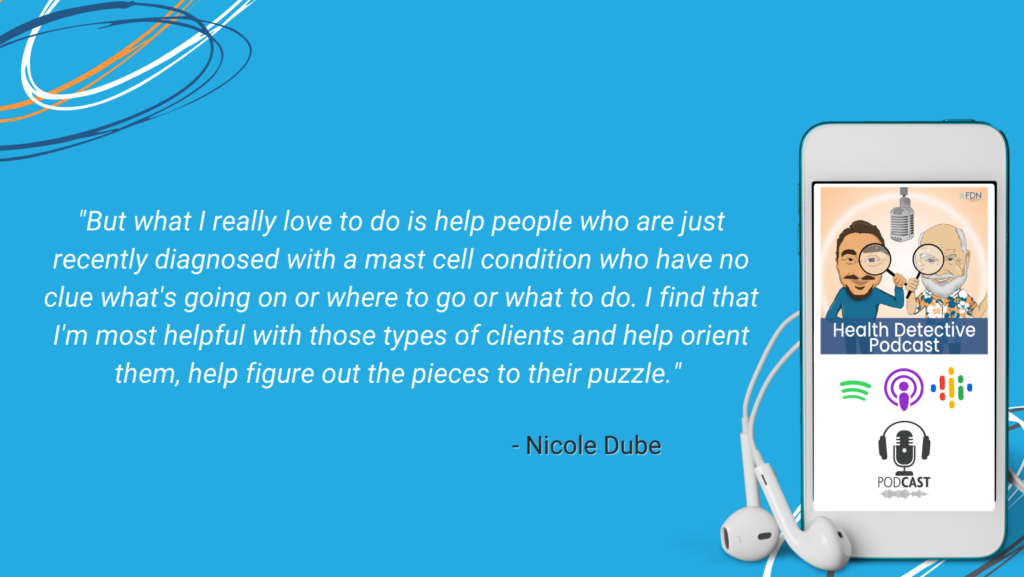
But what I really love to do is help people who are just recently diagnosed with a mast cell condition who have no clue what’s going on or where to go or what to do. I find that I’m most helpful with those types of clients and help orient them, help figure out the pieces to their puzzle. So that’s where I tend to focus.
But I do work with people who have gut health issues, autoimmune issues. I don’t limit it just to mast cell. But I find most people who find me are people with mast cell conditions.
[00:41:02] Detective Ev: Very cool. To the degree that you’re able, cause I know that there’s private things that we can’t share, but again, to what’s comfortable for you and them, is there any client success stories that really stick out that might be worth sharing? Because I feel like it’s one thing to be doing FDN in general, but with the specific things that you’re kind of working with, I feel like these people are so lost sometimes. They’re probably quite hopeless because they’ve really been given no hope other than, here’s some high dose medication.
So, I’d love to know if you have any client testimonials that stick out.
Mast Cell Client Success Story
[00:41:28] Nicole Dube: Yeah. I just heard recently from a client. When I worked with her, she was super sick. I remember doing a zoom consult with her, a video consult with her. Her mom was with her and she’s an adult, in her thirties.
She just couldn’t even sit up, like, she was laying on her mom’s lap. She was just so incredibly ill and just in so much despair. We went through everything and her just being super concerned about not just how do I feel better physically, but how do I get my life back? In so many cases, it completely rips you out of your life, your relationships, your job, your finances, and all of that. I remember her asking me about dating and, am I ever going to have a relationship again? Am I ever going to feel better again?
We worked together for a period of time. I got a message from her about a year later and it was so funny. She had moved to California. She was out in the world again and had her healing breakthrough. She turned that corner. She was going out to restaurants and had a new relationship. She was so happy. I remember feeling so happy for her, that she was able to create a new life for herself that made her happy, brought her joy, and had all aspects of it. She had a work life, a personal life. Her health was dramatically improved.
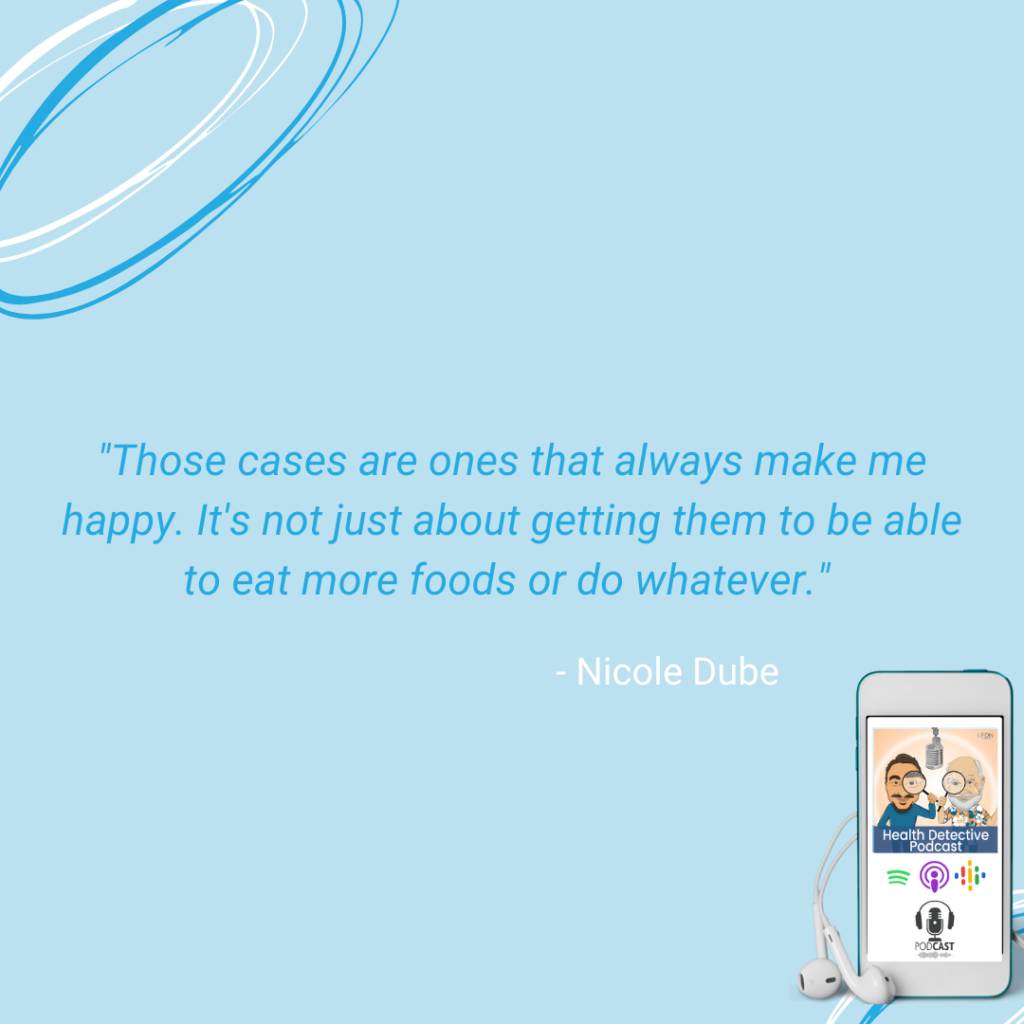
Those cases are ones that always make me happy. It’s not just about getting them to be able to eat more foods or do whatever. It’s about them being able to create a life that makes them happy where they feel like they’re contributing to the world and have meaningful relationships.
The Ripple Effects of Chronic Illness
That’s really my goal – to help people get back into the world.
[00:43:06] Detective Ev: Wow. That’s pretty cool. It’s even cooler that you get to call that work, right? That’s literally work that’s the business.
[00:43:11] Nicole Dube: But, you know, I think sometimes when people have serious or chronic or complex health issues, we tend to focus on the physical, like eat this food, take this supplement or this matter, whatever, but we don’t talk about the rest of your life and how it gets affected.
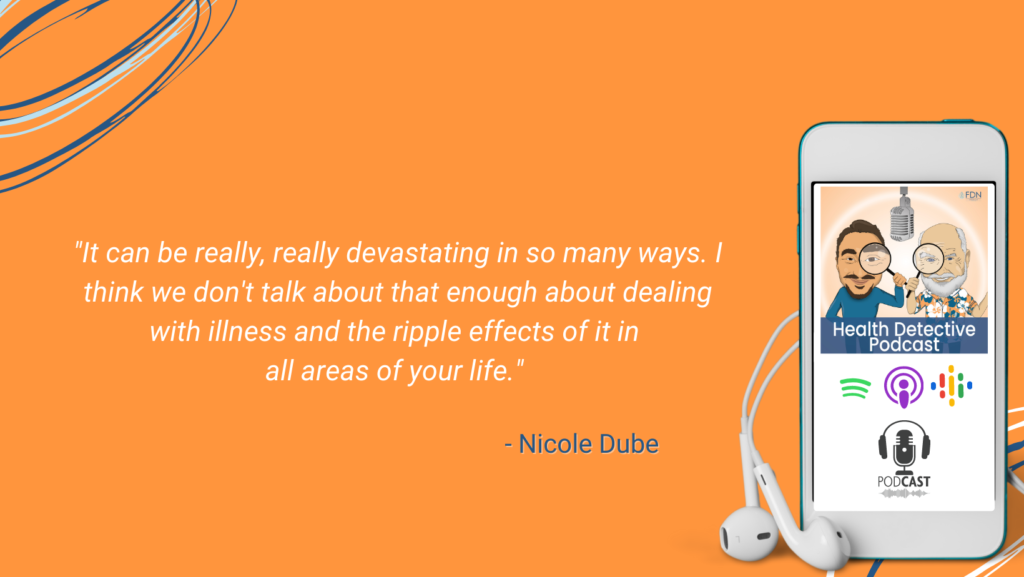
You know, it’s like some people can’t work anymore or their partner leaves them. It can be really, really devastating in so many ways. I think we don’t talk about that enough about dealing with illness and the ripple effects of it in all areas of your life.
[00:43:38] Detective Ev: Yeah, I think even though I don’t relate to the condition, I just related to the story because instantly when you just talked about, it’s a 30-year-old person that has to lay on their mom basically, to get through the call. I just thought about certain stuff in my own family, my mom and myself with certain things.
I would say the lifestyle stuff, sometimes, is what’s killing you even worse than the physical things. Because maybe not consciously, but in the back of your head, you kind of know that this is not forever. We’re not here that long. So, with each year that goes by with one of these things, you’re just like, holy crap. Like, I don’t get that back. It’s a little debilitating.
Positive Perspective About Personal Health Journeys
Now people like you and I, thank God, we wouldn’t ever change anything because we get to live passions and do what we want to do. But no, at the time, like, as an 18-year-old kid where I can’t even eat more than 400 milligrams of salt in a meal without extreme vertigo, that sucked.
And it’s kind of funny because I don’t even know if I actually wanted to be a person who would go to college and drink and go to parties. But it’s almost this thing in your head. It’s like, at least, I wish I would’ve had the option. Like I want to go to a party, I want to meet cute girls. You kind of want to do that. And I’m sitting here, I can’t even eat salt, let alone go out and hang out with you guys till 3:00 AM. That’s just not going to work.
But again, looking back, I wouldn’t change a thing, but it’s tough when we’re in the moment. So, to be able to give those experiences to people who might not ever work in the health space, that’s pretty rewarding work.
[00:44:54] Nicole Dube: I’ve always found too, I don’t know about you, but if I go through a phase where maybe I have a flare, they don’t happen in the same frequency, but if I’m in a flare, my immediate reaction is to get down about it. Be like, are we back here again?

But what I’ll do is I’ll think back to where I started from and think, like, you were literally in a wheelchair. You can go out of the house and walk around. You’re going to be fine. It’s all about perspective and always knowing that it’ll pass.
On the Other Side of Chronic Illness Is the Gift of Gratitude
You will very much get to a different place if you put in the effort to do it.
[00:45:23] Detective Ev: Everyone always talks about gratitude; and what it does is it creates the most authentic genuine gratitude for life you’ve ever had.
I speak in schools for like the mental health stuff. I don’t actually talk about the functional side there. It’s more just a motivational speech to get them to talk in general. Get them help, get them on the right track.
It’s funny because sometimes, not always, but I’ll have to do like six presentations in a day back-to-back to back-to-back. The teachers will say, how do you have so much energy to do this, especially with what you’re describing? It’s like, I don’t even know that I have the energy. But what I remember every time I’m getting tired with that, I try to instantly remember, Dude, you wanted to end your life eight years ago, and now you’re standing up here with the ability. All you got to do is give it your all for 40 minutes and you could change that for someone else.
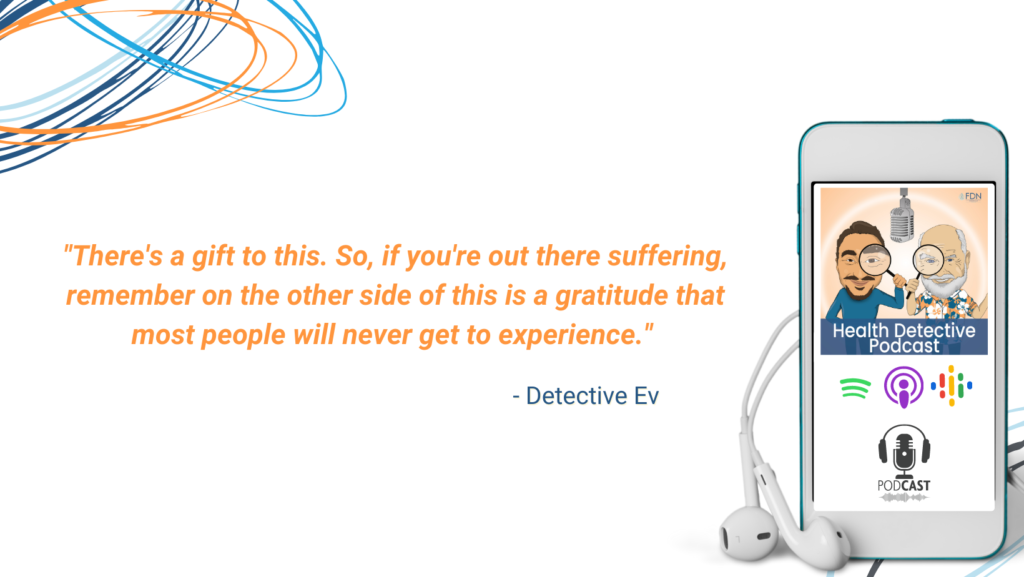
That’s a gratitude you can’t fake. You can journal about it all you want, but that’s authentic to people like us. There’s a gift to this. So, if you’re out there suffering, remember on the other side of this is a gratitude that most people will never get to experience.
[00:46:18] Nicole Dube: Yes. That’s what makes the work so much better. You have such an empathy and a shared experience that you can’t teach as a practitioner. You just lived it, and you know it. So, I think it’s so important to stay in that space of gratitude and hope for people.
Where to Find Nicole Dube
[00:46:31] Detective Ev: Amazing. All right, Nicole, we will wrap it up here.
I want to know where people can find you because out of all these episodes, like I said, you’re the first one to come on and talk about this. Guys, you’re dealing with an FDN mentor, so I’m totally biased. But I think it’s fair to say that if you can work with someone like Nicole for conditions like this or something similar, you’re probably pretty wise to do it.
So where can they find you?
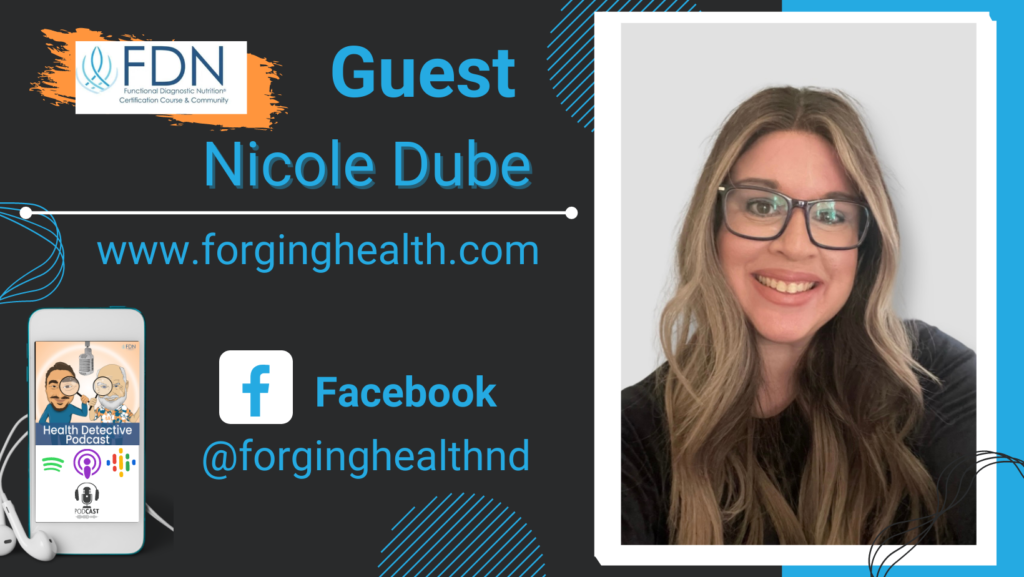
[00:46:51] Nicole Dube: Oh, thanks so much. My website is forginghealth.com and you can find me there. I’m also on Facebook, under the same name. Yeah, you can reach out there.
[00:47:02] Detective Ev: Sweet. We will have that in the show notes, of course.
The Health Detective Podcast Signature Question
Then Nicole, we will finish up with the signature final question on the Health Detective Podcast.
It’s not anything too crazy. Don’t worry. But it does challenge our practitioners because we always think in bio individual ways. So, it might get you there. But the question is, if I could give Nicole a magic wand in this case, and you could wave it and get every single person in this world to do one thing for their health, whether that’s literally do one thing or stop doing one thing, what’s the one thing you’d get them to do?
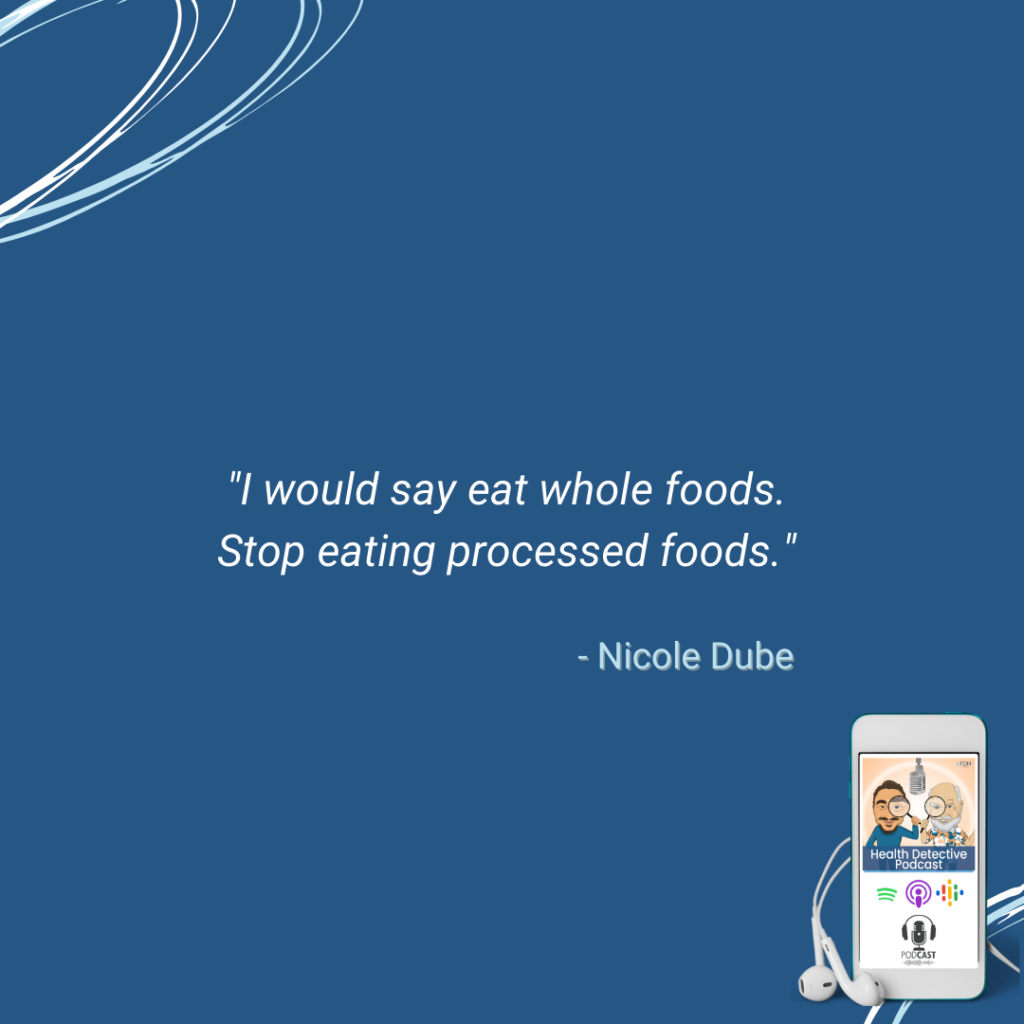
[00:47:32] Nicole Dube: Oh gosh. I would say eat whole foods. Stop eating processed foods.
Conclusion
[00:47:40] Detective Ev: All right, guys, that’ll do it for today’s episode with Nicole Dube. I hope that you guys enjoyed this. This is always fun to get a new medical condition or topic on here. It is kind of sad listening to these stories and hearing what these people went through. But I love nothing more than people who take these things and turn it into their passion. Right?
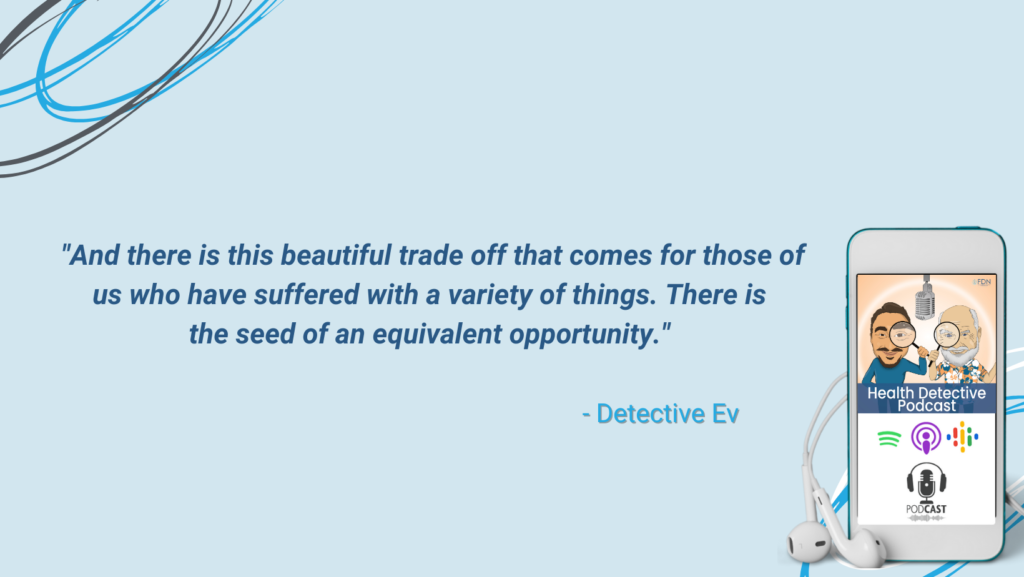
Passion into pain. That’s a way to live a life. That is how you should be doing this. And there is this beautiful trade off that comes for those of us who have suffered with a variety of things. There is the seed of an equivalent opportunity. That’s what Napoleon Hill says in the book Think and Grow Rich, one of the best-selling business books of all time. Check that out if you haven’t. I digress though. You don’t want to get me started. I know it’s been a long episode.
Well, if you guys like this information, we would really appreciate you leaving us a five-star review on Apple and or Spotify. In fact, if you’d be so kind as to do that, we would love ya even more than we already do.
I’m looking forward to talking to you guys again soon, but until then, please take care.
You can always visit us at functionaldiagnosticnutrition.com.
To hire a coach, go to fdnthrive.com.
For a free health review, go to fdnthrive.com/match/.

